#does in fact understand every sacrifice that goes into the battles that they fight that he must sit on the back lines for
Text
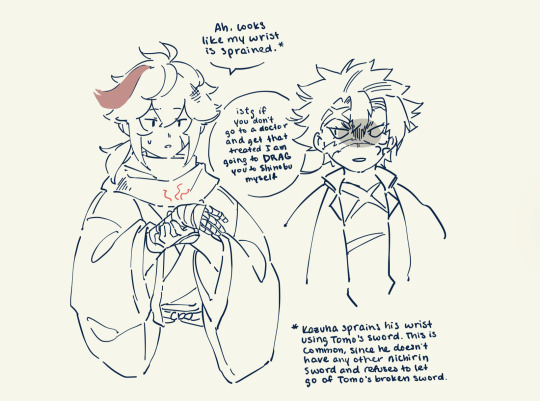
The eventual kazuha and sanemi dynamic
#kny crossover#genshin impact#kaedehara kazuha#shinazugawa sanemi#one day I’ll finish writing the first chapter. one day#anyways I love thinking about these two#i think platonic relationships are so fascinating#like you could definitely construe so many different friendships as romantic ships but to me these two as friends has so much potential#sanemi canonically dislikes Giyuu because he gives off a ‘better than everyone else there’ vibe that is purely unintentional#and canonically is friends with Iguro for reasons I still cannot figure out#sanemi’s so interesting because it’s not like he’s a purely chaotic character despite what his first appearance would suggest#the manga and genya’s memories clearly show that he has a lot of respect for oyakata-sama because oyakata-sama is not high and mighty and-#does in fact understand every sacrifice that goes into the battles that they fight that he must sit on the back lines for#sanemi is a very loyal person I think once someone has earned his loyalty even though he owes about showing this in very aggressive ways#I think he goes off against genya especially because genya fighting as a demon slayer goes against everything that sanemi has fought for#since they lost their happy lives sanemi has been fighting for at least one of them to still be able to live normally and he probably thinks#that Genya spat on that sentiment by becoming a demon slayer anyways#anyways I think sanemi and kazuha would have such an interesting dynamic#sanemi has the authoritative upper hand as a pillar but kazuha isn’t even a demon slayer which means sanemi’s position doesn’t do much#beyond acting as an indicator that he is one of the strongest of the corps anyways.#they’ve both lost a lot but sanemi still has someone to fight for whereas kazuha is holding onto the last embers of a corpse’s wishes#and I think them having a talk about their motivations would be very good#because I don’t think at this point that kazuha has very much reason to live beyond carrying on Tomo’s wishes#if the swords are parallels to visions I think Kazuha’s turning point will be when he receives his own nichirin sword#sorry for the long tags lmao
293 notes
·
View notes
Text
Riku is a Disney Princess and here's why...
Riku displays Princess features
He's just so Princess. And I've been thinking why is he so princess what is it that makes him like this
So I turned to the official Disney princesses and the comparison is something else.
Kingdom Hearts itself does this all the time with how Riku or Sora acts and gives phenomenal parallels through the categories
Animal Sidekick
Royal Bloodline
Central Character
Prince
Adventure
Disney Princess Parallels

Animal Sidekick
One of the mainly criterias are animal Sidekicks, but wait Riku doesn't have one does he?
Guess again.
He in fact does, and so does Sora.
Let's take a look at Dream Drop Distance— a game where Riku displays affection and is accompanied by these silly little guys known as Dream Eaters and his main one is Komory Bat.


The novels add some great details and scenes where they show affection to Riku. They help him fight as well as rub against him.
How could you not find them so adorable and want one?


Royal Bloodline
The next thing is royalty and just note I'm using only knowledge we definitely know or implied, sorry no bloodline theories. In the criteria most princesses are princesses from having a royal bloodline or displaying some act of heroism.
And throughout the series we see these qualities of heroism.
Starting out in darkness, he redeems himself by displaying heroic qualities as any 15 yo in fiction.
In the second game, Riku helps defeat Xemnas, the ultimate bad of the group they were trying to defeat.
After KH1, he deeply regrets his actions and sacrifices himself multiple times, such as pushing Sora out of the way during the final Xemnas battle. Instead of Sora getting hit, he does himself. In DDD, he then displays skills to accept himself and who he is while also rescuing Sora from darkness.
He even states, "...Are you what's trapping him in that nightmare? Cause if you are... I'm what nightmares fear!"

P.S. the JPN translation of the scene is: If you're a nightmare, I'll eat/devore you
And in KH3 not only does he comfort Sora when he feels down, but he sacrifices his own life for Sora's in the keyblade graveyard
Central Character
Riku is one of the main characters, he is the second important character— the first being Sora. Riku actually is in more games than Sora. In 358/2 Days, Sora is not in the game. He is only shown through flashbacks, but Riku he is there. He interacts with Xion and Roxas. Then in DDD the game centers around him more than it really does Sora.
But even in the other games he is still important. Without him, all of the games would be different. No character could take his place.
If Riku simply didn't exist, there would be no one trying to bring destiny islands to darkness. Terra and Aqua wouldn't have gone to Destiny Islands since they came there following Riku's light.
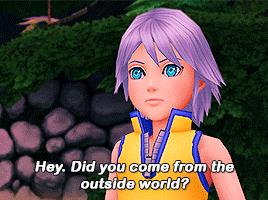
Kairi also would never have gone there because there is no keyblade wielder there. Sora would probably make friends with the other Islanders and he wouldn't have gone on an adventure and there would be no one bringing the princesses to Maleficent.
Prince
Not every princess has a prince, but he certainly does. And Sora is certainly his.
Riku even called him a prince before

They would have a mutual relationship of both saving and comforting the other.
They both have a care and understanding. Sora always thinking of his princess and Riku does all he cans for his prince. They rescue the other multiple times, they sacrifice for the other, and the two even fight together
Adventure
Not every princess goes on an adventure, but Riku certainly does. He goes from using darkness to feeling at his lowest point where he has to accept himself and his darkness (and even possible romantic feelings for Sora his prince).
He then spends a year trying to defend his prince and sacrifices his form to help him awaken. Then he becomes a version of himself that is almost like a monster and refuses to let anyone see him like that.
But when Sora does he doesn't care Riku is still his friend, his princess. It doesn't change a thing and Riku is still Riku. And Sora loves who he is
This gives so much fairytale prince and princess vibes.
They both work together and save the day and after being stuck in darkness they're okay cause the two are together. Then a light appears and the adventure seems to be over..
But no, they both take an exam for becoming keyblade masters. Riku goes through it trying to understand himself and how he feels about Sora and his darkness. He becomes a dream eater for his prince,
Who says princesses can't do rescuing too?

In Recoded, Riku gets kidnapped by Maleficent and Pete and Sora his prince goes in search to save him.
His next journey arrives when he goes through the realm of darkness to search for a missing keyblade wielder. And when Riku is against her he calls out Sora's name and Sora, his prince comes to the rescue. Together they help free her from the darkness. Then after Riku sacrifices himself for Sora, Sora saves him by putting his heart back to his body.
And Riku is on his way to find his prince once again at the end of KH3... His adventure is still ongoing...
Fairytale Parallels
There are so many fairytale Parallels in Kingdom Hearts. Riku sacrificing himself with every little things reflecting a Disney princess.
In the beginning Riku wishes to explore other worlds and leave his island. Many of the Disney princesses also expressed this desire.
Ariel—who is basically a scholar, wants to know more as well as go to the human world.
Belle wants to go on an adventure that's more than her simple everyday life.
Rapunzel wants to go outside to see the world but also see floating lanterns.
Anna— who has barely any social interaction, is tired of being shut away from the world and wants to also experience it.
Riku also gets tricked/manipulated by darkness. While the other princess don't become an antagonist for the first game like he does, they do get tricked or manipulated.
Ursula tricks Ariel into signing a contract to make her into a human where Ursula hopes to eventually become the ruler of Atlantica when Triton trades places with her.
The evil queen manipulates Snow White into taking a bite of her apple after feeling bad for her.
Maleficent tricks Aurora into touching the spindle of the spinning wheel, causing her to die.
Mother Gothel manipulates and gaslights Rapunzel through her entire upbringing.
Raya gets tricked by Namaari into showing her the chamber with the magical gem
Anna gets tricked by Hans into thinking he's the one so he could rule her kingdom.
Riku makes sacrifices throughout the series like when he does it for Sora in kh3 or even sacrificing his form when fighting Roxas to wake Sora up. In general he sacrifices himself for Sora, as well does Sora sacrifice himself too and there are also many princesses who also make sacrifices
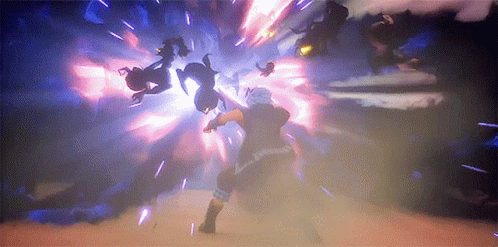
Mulan, wanting to protect her father, she sacrifices herself when she takes his place in the war.
While he's not technically a Disney prince, Hercules sacrifices himself to make the dive and save Meg. Hercules also gave up his strength for her but she pushed him out of the way of a pillar to then save him as well. This relates how Sora and Riku both constantly sacrifice for the other.
Anna sacrifices herself for Elsa by freezing to death.
Belle sacrifices her freedom to save her father.
Rapunzel was willing to sacrifice her freedom to save Flynn's life.
And there we have it, I'm sure there are many more examples then what I said but Riku is a Disney princess and should definitely be added to the line up.
#kingdom hearts#soriku#riku#sora#kh analysis#discussion post#princess riku#disney princess#Kh mulan#kh ariel#kh frozen#snow White#frozen#mulan#sleepy beauty#aurora#seven princess of light#kh riku#soriku kh#dream drop distance#kingdom Hearts 3
93 notes
·
View notes
Note
Saw a gif set of Poe sticking up for Holdo, and now I'm thinking about how Poe is first to notice not one, yet TWO self sacrifices in tlj
Oh yeah, I think about that a lot. So much so, that I made a gifset about it once. It's something that I think goes over people's heads, by and large, just judging from how they talk about Poe in that movie -- but the sheer fact is, the movie opens with Poe doing the exact thing that Luke does. He goes out, one man against an army to give the Resistance more time to evacuate, by offering himself up as bait.
Poe recognizes a self-sacrifice, because...he's tried it. We see him do the same thing, it just largely gets overlooked because what happens is that it doesn't work. That's the horrifying fact for Poe: he's convinced that the most he can offer the Resistance is his own noble sacrifice, and if in the meantime, he can take down a fleet killer that could kill them all later? That's even better. But instead, Poe survives - Poe survives, again, let us not forget that he's also the only one, save the First Order and BB-8, that night in the village - and instead he has to reckon with the fact that people under his command have died again, while he hasn't.
"Dead heroes, no leaders" in my perspective, tlj is by and large Poe being forced to reckon with the fact that there's more to him and more to this fight than just dying for the cause. One thing I'm noticing throughout my chronological reread of stuff that's about/features Poe heavily, is that there is this desperate need for purpose that guides him, and that purpose seems to truly be to be a soldier, a hero that can pull of last minute miracles, and if he happens to die for the right reasons at least it'll be for the right reasons, and if he gets a little adventure in between, that's even better. That elusive search for that purpose pushes him off Yavin in Free Fall, and he's still struggling to find it when he's with the Defense Fleet in Age of Resistance.
So, Poe's spent majority of his life wanting to be a soldier like his parents. In some ways, he thinks that's what he's best at. When Leia implies that she can see more in him after L'ulo's funeral in the comics, Poe is confused - he can't see that potential in himself. And then even after he understands what she's trying to tell him, in the Enshado arc, he mentions to Snap that he prefers being a pilot, and not have to make the hard calls or moral decisions that command has to - for Poe, he's more than happy to be t he person to jump into the fire and do what's necessary, even if it costs him his own life. He doesn't fear death, he doesn't even fear it in Free Fall when he's just sixteen/seventeen years old, and it's clear that he still doesn't really by the time the movies roll around.
And TFA, he was originally supposed to be the martyred hero. And he still almost is - but that sacrifice is aborted, and suddenly Poe is the survivor of that mission to Jakku. And the First Order is so much larger than any of them could have ever imagined - so he offers himself as bait, to give the Resistance some time. He could have easily died, during that initial run. He strapped experimental tech that hadn't even been tested to his X-Wing, just to give him an edge, so the Resistance could finish evacuating. He was ready and willing to die for them.
And he knows, first hand, more than anyone else in the Resistance, just how big the First Order is. He puts himself between them and the ship he was just held captive and tortured aboard for days - and decides that if nothing else, the dreadnought has to go because it's a fleet killer.
(And sure, no one in that battle went into it for the "right" reasons. Every Resistance officer in that fight wanted a fight. They've lost people, just lost their home, lost their only support - and I've no doubt that's also going through Poe's head.)
But then...Poe isn't the one to make the sacrifice. It's everyone else, and it's on his command. And he knows it was the right call to make, because the Resistance can't be killed by a fleet killer later (good thing, too, since the first order ambushes them) but...he still lost people under his command, and he has to deal with the worst weight of leadership: being the one to survive.
And then he straight up gets grounded. Like, his X-Wing is destroyed. Poe cannot be the kind of hero that he believed he was anymore - that soldier/rebel pilot to run headfirst into things. Now, he's pushed into the role that Leia normally is: the one to stay behind, and trusting an important mission to someone else. Being the person that everyone tries to come back to.
And it results in Poe becoming what Leia knew he could be all along: someone people could trust and be inspired by to follow, to fight for. When the Resistance feels that it can't trust Holdo, they trust Poe. And under the threat of total obliteration, and the knowledge that they're officially the last line of defense between the galaxy and the First Order, and almost dying several times and losing so many people he was friends with and almost losing Leia - I really do think Poe realizes he doesn't want to die, he wants to live for the Resistance, for the galaxy, and not just die for them. He knows, now, that there's more to him than a noble sacrifice, and he sure as hell doesn't want the people who died while he got to live's deaths are in vein (we see that lampshaded explicitly in tros).
Poe recognizes a self sacrifice when he sees one, because it used to be the first thing he'd think to do. But by tros, we see that he cares less about a noble sacrifice, and more about surviving -- which is the biggest hurtle he's maybe overcome, considering how little he's always feared death.
This is already a touch incoherent and rambly because I'm tired, but I think - I think the slightly tragic thing about Poe is that he wanted to be a soldier like his parents. But he got so good at it, that he ended up flying straight into being a leader - and that terrified him, because that meant that Poe had outgrown the purpose he's been seeking his entire life, and it also means that he has to carry a lot more burdens, including the burdens of when his plans go wrong. He can't be the person to die with his squadron, he gets to be the one to survive and carry their sacrifice with him.
#ask box#userorb#this got so incoherent i'm so sorry but i. am tired#sui ideation cw#just in case#my meta
7 notes
·
View notes
Text
Mini-post (meta?) on Daisuke's Weakness

You know, a lot of people had complained for AGES that Daisuke had no weak points, that he was "invincible" and had no flaws. But that's not true. Daisuke has flaws and weaknesses.
On today's Daisuke Tuesday post, we will talk about Motomiya Daisuke's weaknesses. No, this is not a negative post and it's most to show how complex this kid is despite Daisuke himself saying he's easy to understand.
So, first thing you have to know is that Daisuke is not that smart but also not that stupid -- i always thought he was on the middle of those two edges, in which he's smart for some scenarios but stupid most of the time when he's not focused on a goal.
Daisuke is a pragmatic type, which means he does not overthink on unnecessary things like Miyako, but he has an issue of struggling with things his mind cannot comprehend. Things like a Vending Machine in the middle of the jungle, or a manhole in an Edo period city were things Daisuke himself questioned when going to the Digital World, things which in his opinion shouldn't be the places to have those no matter what.
Where am I going with this? Well, on this "interview" he describes he cannot understand ghosts. This sounds familiar when you remember the Original Stories ~Spring 2003~ drama CD track focused on Daisuke's backstory as one of the victims of Vamdemon attack back in August 3rd 1999. Daisuke talks about it briefly in the anime too, on ep 14, when the kids are discussing about what digimon event made them become Chosen years later.
Knowing this, you might get the gist. Daisuke's weakness is what he cannot understand. And more.
On ep 8 and 11 we witness Daisuke being under pressure and not working well with it. The Kaiser psychologically tortures Daisuke for his own amusement, forcing Daisuke to obey every word and request given in order to save his friends. In the end, the Kaiser says he will only let one of them be freed, but Daisuke refuses and goes into despair. Then, once the time is up... Daisuke himself jumps into the conclusion he is the one who should be eaten by Deltamon. The Kaiser accepts the offer, but thankfully the real 02 kids appear and save Daisuke from death.
Now, on ep 11 Daisuke is again pressured by the events: He cannot understand what Taichi and Yamato meant about fighting your friends and how this makes them understand each other, so he feels the Digimental of Friendship is not his. He gets in conflict with Takeru all again when the Kaiser captures Patamon, who is saved by Garurumon. Daisuke cannot understand why Takeru would sacrifice himself for Patamon, or understand how Taichi felt regarding Agumon. In the middle of the battle he's really falling in despair because there's no other solution to save Agumon from the Evil Spiral, until he manages to get the glimpse of what the others were telling him this whole time, admits his stupidity and the Digimental comes directly to him.
Okay, but why those two episodes are important here? Because other weakness he has is not working well under pressure. If you torture him psychologically to the point he starts getting confused and uncertain of what to do, he will break. This connects to the fact he fears what he cannot understand, like ghosts and stuff.
Thus you have this formula to beat this kiddo.
Have fun breaking Daisuke's mind in your stuff for fun and profit!! (?)
44 notes
·
View notes
Text
Good Partnership: Olive & Otto vs Ladybug & Chat Noir
When it comes to the aspects that make up Miraculous Ladybug, teamwork is one of the major themes (second to the fact that it’s ok to pressure your partner into accepting your love). Then there is the issue that Ladybug and Chat Noir’s roles as a duo are not always equal in some battles. To see the large contribution gap between LB and CN and how awful the chemistry is, let’s compare the properties of their teamwork to another iconic duo. Olive and Otto from Oddsquad.
Ladybug and Chat Noir:

Ladybug generally does all the planning.
Chat Noir rushes into the fray, typically using cataclysm without thinking things through.
He is often used as a distraction
His largest motivation for fighting akumas isn’t to protect Paris but stems from his desire to see Ladybug and act as a human sacrifice to gain sympathy from the audience. (And it works).
Ladybug is given more responsibility and roles during concerning the miraculous.
She has a more tranquil and wise Kwami.
Adrien only does the bear minimum associated with the battle against Hawkmoth which is fighting the akuma of the day.
Ladybug is more responsible.
Chat Noir is a jokester who lives up to that title at the wrong times.
He depends on Ladybug’s leadership.
He throws tantrums whenever she doesn’t accept his overbearing, unhealthy obsession love.
He isn’t any stronger than the temporary heroes.
He works through his anger by leaving Ladybug to fight on her own and choosing to stay home and sulk like the toddler he is without even talking to her first.
He has no qualms about lying to her and pretending to be a different person.
More is expected of Ladybug because given the rules of the show, if something goes wrong for any reason, she is to blame.
He tricked an agitated Ladybug into going on a date with him.
He attempted to purposefully cause an akumanization just to see Ladybug.
He can’t take anything seriously to save his life.
He has been shown unable to resist going after Marinette to initiate a relationship with her when he found out she was ladybug.
He was the reason he and Ladybug lost their memories during Oblivio due to distracting Ladybug.
He had no issue with blackmailing plague to reveal a secret that had nothing to do with him while millions of people were drowning underneath his entitled ass.
His list of murder, property damage, unintentional damage, attempted murder, and accidental man slaughters just keeps growing.
His negligence in the future caused the damage of Bunnyx’s miraculous.
The akuma usually captures him and turns him against ladybug.
He discovered Ladybug’s identity and didn’t warn her about the danger she was in.
He is allergic to apologies.
Ladybug usually has to run damage control.
She gets angry whenever he tries to kiss her (valid)
She has more stress on her plate and yet is expected to know everything about Chat Noir and sense if something is wrong a millisecond after the first flag.
He never tries to correct people when they assume they’re a couple.
It is made abundantly clear that he does not know her well at all. (Ex. In he fell for a fake ladybug that tried to kiss him twice)
During the New York Special he didn’t tell her that he was leaving and thus left Paris without protection.
Ladybug never addresses his obnoxious grudge against the temps.
He has no issue with leaving his ring on a rooftop without Ladybug knowing completely disregarding the fact that anyone could’ve found the ring and use it for evil.
Romance being forced down our throats.
Olive and Otto:
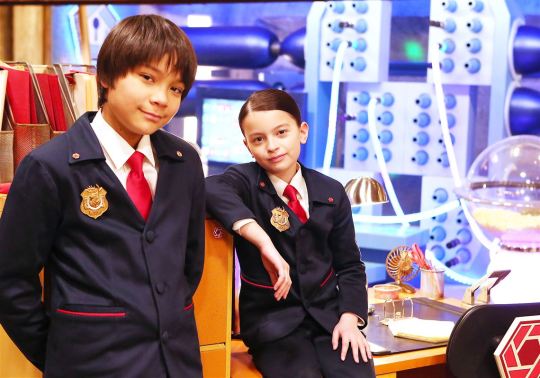
Good representation of friendship.
Character development.
Olive typically understands the math concepts more quickly than Otto.
Otto contributes to the team and tries to balance out the mission load so Olive doesn’t have to do all the work.
There is no corny romance being shoved into the episodes so their friendship is platonic in a cute way.
They genuinely care for each other.
They always see the mission to the end while gaining new knowledge from every new math concept they learn.
Their teamwork is a representation of problem solving, learning that’s it’s okay to make mistakes, and perseverance
Otto protected Olive from Todd when she nearly lost moral
A good representation of toxic partnerships (Todd and Olive)
The lesson aimed at impressionable young children is valuable
Otto doesn’t always rush into things and is shown to be intelligent
The chemistry they have is unique as with all the other iconic duos in Oddsquad
They are enjoyable to watch because of how down to earth they are
Neither feels nor acts entitled to the other’s time and attention
The show’s premise is an international agency with kids fighting evil in agent suits! How is this not fun to watch!
Because of their numerous successes (that are not made useless by a third-to fourth season) Ms. O offers them the positions of Mr and Mrs O in their own agency.
Olive strictly states that there’s nothing romantic about being partners which Otto agrees and now they run their own Odd Squad together as best friends.
It’s not like romance in partnerships is awful, but with the way Miraculous Ladybug portrays it, it’s either romance or nothing. Taking these facts into consideration, who makes the better duo?
#miraculous ladybug#adrien salt#mlb partnership salt#odd squad#Olive and Otto supremacy#mlb salt#love square salt#chat noir salt
144 notes
·
View notes
Text
“ Twisted Perfection “ A Reflection on the Anthology ,“ Lockdown Litanies : Countless Untold Stories"
Song Association
Essay by Kristyle Lacostales

To begin with, the author is excellent in showing different kinds of loves, different
kinds of scenarios, which is why after reading those 9 poems, we are more open to
different kinds of love because we encounter the kind of love that is one side, there is
kind of love of mother sacrifices,There is self-love and there is love that can fool you.
which is why reading this poem is advantageous to me, because we are anxious about our
surroundings, we have a broader perspective on love after reading these nine poems.
Now that I've read “Dear Diary,” it is painful to have someone you love the most
leave you because every line shows how her soul is continuing to break to the point
where she is unsure of how to proceed with her life. and this poem shows you how love
can be deceiving because she is unable to move forward in the line, "Over two years I
froze inside And locked myself unable to do things." I understand that it is common for
people to be hurt occasionally and that, in order to move forward in a relationship, one
must take risks, even when doing so results in pain that one can no longer feel. I also
know how difficult it is to heal from a shattered heart because no matter how hard you try
or what you do to build your relationships, there will always be those who are out to hurt
you. Therefore, love is both a blessing and a curse in my life. To summarize the most
heartbreaking line from Faith Hill's " There You'll Be " it goes like this: "When I think
back on these days and the dreams we left behind." That's why, even if you don't want to
go forward, the world will do it for you since it hurts the most at first, but maybe later
you realize you have no choice but to move on.
The character is courageous enough to overcome her own struggles in life. She
once lost a beauty contest, but her life is not defined by that loss, but by her ability to
succeed on her journey. After reading the line from “The Tale of Modern Sisyphus,”
"Gracious to push the boulder up the mountain and begin as if nothing had happened,"
we realized that problem is not enough to deflate us. It is acceptable and normal for us to
struggle, to have problems, and to fight for our lives in order to survive in everyday life.
After reading The Tale of Modern Sisyphus, I came to the realization that I, too, am a
modern Sisyphus. Because I've thought I'd lost not once, twice, or even three times,
there's a lot to tell. However, that battle didn't define me; rather, I embraced it as a part of
me because God gave us problems to learn from and not to be defeated by them. If one
problem is enough to destroy you, what will you do if you're unable to move forward inthe following days? Just because of your never-ending problems, and that reminds me of
the line “When prayer so often proves in vain, hope seems like the summer bird” by
Mariah Carey and Whitney Houston, " When you believe " We must accept that there will
always be problems in our lives because life is more than just a struggle.
O' Yayi (A Prose Poem) This poem demonstrates her husband's unwavering love
for her, despite the fact that she does not recognize him but instead recognizes Dante after
reading the line "That cheerful but feeble voice." That spark in her eyes after saying his
name." She only remembers Dante despite the fact that her husband provided her with all
the comfort and luxury a woman could ever receive from a loving husband in order to
alleviate her pain after experiencing the trauma caused by the tragedy during World War
II. that's why this poem remind me of song shiver by cold play because of the line "So I
look in your direction but you pay me no attention, do you? " That's why I don't
understand why people, when they love, give their all and make every effort, but there is
no love to begin with.
Reading “Two red laces on the wonderwall,” the man here is obsessed with the girl
who turns out to be a secretive person, as seen in the line "I opened my whole to bare my
soul." However, it turns out that the woman is responsible for his death, so he wants
revenge for falling for a secretive woman. At first glance, this poem seems to be about a
couple romanticizing themselves, their love for each other, and their passion for making
love. However, the word "vindictive" indicates that the man wants revenge on her for
falling for his lies. This poem reminds me of the song " Sweetest Lie " because of the line
"Well you play your part so easily, you fooled yourself again." This poem is about
betraying and manipulating someone who genuinely loves you. Because of this, it is
imperative that when you are in love, you have a complete overview of your life partner
because there are times when they will lie to you without even realizing it.
Analyzing the fifth poem, “Umbilical” is about a mother giving birth to a son, as
evidenced by the line "The pain she endured just for me to see, silence in her womb- a
world without light." In this poem, the author addresses the sacrifices and love of a
mother, even if their life is on the verge of death. That’s why this song, You Can't Lose
Me reminds me of the sacrifices and love of a mother because of the line “Momma's
waiting at the finish line”. Every mother sacrifices herself to the point where she does not
consider what could happen to her, because while the child is still in the womb, the
mother attaches feelings to the child because she sees him or her as a gift from God that
she must protect. As a matter of fact, we consider mothers to be heroes Reading the sixth poem " RE: Paper (I'm Red,IMRad)*, the author wants to show
us how the Philippines is trying to have a high quality of education despite the
inadequacies of its people.Its shows in the line “ Parents are certain, K to 12 is a
burden.” In the first moment of implementing the K12 program, many parents
complained that it was a burden. This is because, in the past, parents used to send their
children directly to college after graduating from high school. Therefore, implementing
k-12 program teachers should upgrade their skills to the fullest extent and have access to
a better quality education because, as time passes, students are naturally inquisitive and
are maturing faster than you might think. Consequently, teachers must have the quality
knowledge education to meet the bare minimum education requirements.And reading the
poem reminds me of the song "The Climb" by Miley Cyrus because of the line, "That
dream I'm dreaming, But there's a voice inside my brain saying, "You'll never reach it."
For me, this song symbolizes the struggle of the modern student.
When people read the seventh poem, "3 A.M. Awakening," it opens their eyes to
how hard it is to deal with anxiety. in the text "Harper, what's wrong with you? Act in
order." People with anxiety, depression, or any other mental illness are hard to understand
unless you've been through it yourself. You can't make someone do what you want just
because they're going through something you don't fully understand.Because of this, the
author hopes that by reading this, you would try to empathize with other people and gain
some insight into their experiences and perspectives.That's why I dedicate the song "The
Fear" by Shins, which has the line "This fear is a terrible drug, if I only had sense
enough."
In the eighth poem, “My frail lady,” the line "such a frail, frail lady" shows how
fragile and weak the main character is. However, just because you are weak doesn't mean
you can't achieve your goals. At first, it will be hard, but you'll get used to it.As per my
observations, the persona has a limited intellect, which is why she has the tendency to
believe that she is feeble, which is why she is attempting to destroy her life only because
she is intellectually deficient.That's why I remember the line "catching tear drops in my
hands only in silence" from the song "Skyscraper," by Demi Lovato, Because it's normal
for our minds to get weak sometimes. our souls, so we needed to take breaks so we could
clear our heads and see things more clearly.
In the last poem, "Major Arcana," the author shows us the "might journey" of the
persona. This is because the persona will do a tarot card reading to try to find out what
will happen to her in the future. This is why the first card, "The Tower," shows that the
persona will have to deal with a problem that she caused and will have to deal with the consequences.While in "Card 2: The Chariot," she is now facing a successful time in her
life because she has made it through her whole journey. This card shows a journey with
her family, work, or love, since it shows her moving around. In "Card 3: The Lovers," she
is now with the person she loves. It's about the persona taking a risk in the relationship
because the line "the love you build around yourself is enough to cushion you from any
fall" means that she has enough self-love or self-confidence to be able to risk herself in a
new relationship. In the fourth tarot card, "the star," the line "what's going for you is a
wish coming true" means that she might get what she wants. This card shows that she
will get good health, a new job, or even a new love interest. And in the card 5, "The
Hermit," it says, "Take time to sober up and make a thoughtful decision." This is a
warning to the person that she needs to be careful and mindful to make good decisions in
life.In the last card, "The Sun," it says, "Finally receiving its warmth and vitality, you will
also bloom." This means that if you stick with your journey and be brave, you will be
able to reach your goals. This shows that for every bad thing that happens, a lot of good
things will also happen.because of this, it reminds me of the line "And we mean to go on
and on and on and on" from the song "We are the champion" by queen. This is because in
our lives, we are the main character, and we are going to do our own journey and follow
our own path therefore, surviving at its finest is required in order for us to be able to
reach our own dreams in our lives.
After reading those nine poems, I came to the realize that you should be open to
any kind of love but should not give all of yourself to it. This is because love is so
mysterious it can hurt you, heal you, make you happy, or break you.because, in my
experience, there are times when the people you love the most, such as your family, are
more likely to hurt you than to help you. This is because they are often there to hurt you
rather than to help you. As a result of reading those kinds of poem, I am more open to
love, to have a mindful and direct mindset.
2 notes
·
View notes
Text
Shounen anime character archetypes, and how the Adventure and 02 characters don’t entirely follow them
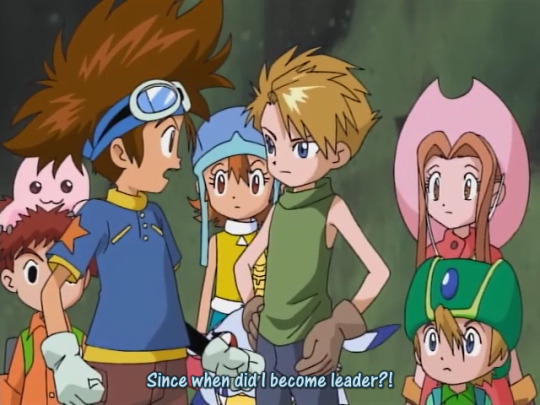
Adventure is a kids’ show, and so it’s only natural that its characters would have certain surface archetypes common to others in the genre, like “the impulsive leader” or “the cool-headed rival”...except it actually doesn’t, really! It was actually a deliberate decision to make the characters go against their archetypes, and even the ones that did toe closer to it still had a number of nuances that distinguished them greatly from what you would usually expect from these kinds of characters. A lot of this was a deliberate attempt to make the characters relatable, so that it would allow each and every one of them to have their own unique strengths that their usual archetypes wouldn’t generally allow them to.
To be clear: tropes are not a fundamentally bad thing, especially since fiction very much relies on them to communicate (Adventure and 02 sometimes being so contrary to media expectations that they often frustrated viewers for not apparently making sense), and moreover, there are tropes that still are very true to reality (for instance, although the archetype of the “crybaby child” wasn’t in this series, many people have stated that Tomoki in the significantly more conventional Frontier was no less a realistic representation of what a child his age might do in an unfamiliar world). It’s also quite foolhardy to claim that Adventure and 02 never indulged in tropes at all, of course. However, things that fall outside the conventional mold are much more difficult to find proper representations of, and there’s an unfortunate trend of many (especially those in the mainstream who don’t quite remember the series well, or mainstream press) often pigeonholing Adventure and 02′s characters back into those tropes because that’s what you’d normally expect of them, sometimes to the point of negatively comparing them to other things -- and that’s just something that really isn’t fair to the series!
Disclaimer: Note that the following post works first and foremost off of the original Japanese version, so if you’re coming purely from the American English dub, there may be some substantial differences in what’s described (most noticeably in regards to Mimi and Daisuke).
Taichi
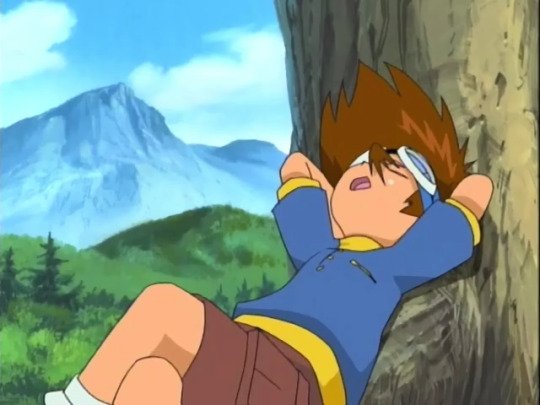
While shounen media has been a lot more willing to change things up a lot since Adventure first aired in 1999, the general idea you get of a shounen protagonist is a hot-blooded one who charges recklessly into everything on impulse. Taichi definitely fits a handful of the traits on principle in that he’s a passionate sports boy, and one who takes an “action-first” philosophy and often acts on impulse, but there’s a lot more nuance to that than you might expect.
Firstly, it would be very off to pigeonhole Taichi as the belligerent type to like fighting and to charge into everything thoughtlessly, because while Taichi does get cocky in the midst of battle while riding the adrenaline, he’s not the kind of person who likes fighting enemies just for the sheer sake of fighting and defeating them (and, in fact, it would probably be incorrect to say this about any Adventure or 02 character). As is pointed out by Koushirou even when Taichi is at one of his most haphazard and reckless in Adventure episode 16, Taichi’s actions are still always out of consideration for others, and he’s the kind of selfless person who in fact only hits his most reckless points when he’s cracking so much under the pressure of needing to do things for everyone’s sake that he even throws himself into the fray out of self-sacrifice. Even during the late points of the series in Adventure episode 45, he felt that the method of “pushing forward despite everything” was the best way to repay the sacrifices their Digimon friends had made for them -- he has a tendency to advocate for actively doing things because he firmly believes that sitting around doing nothing won’t solve anything, or would result in more victims. He has had introspective moments of weakness (see Adventure episodes 17, 20, 21, etc.), and it’s specifically because he has to reconcile the facts that he knows nothing good will come out of being a sitting duck, but he also has to figure out a way to do it that won’t accidentally cause collateral damage.
Taichi is “impulsive” in that he tends to play things by ear, but that doesn’t always mean he advocates for the most aggressive solution -- in fact, there are times where he’s often too chill and is picking the simplest and least complicated thing to do for now while he tries to figure it out later. Plus, it’s not like he recklessly charges into battle against everyone’s wishes -- the few incidents he does are explicitly marked as his moments of weakness, and in fact the reason he gets into conflicts with Yamato so much during the early part of the series is technically because he’s taking the time to argue back at him and try to make his point instead of just going ahead and doing it anyway.
Taichi doesn’t have that much of an ego! Adventure episode 28 reveals that he’d never even thought of himself as the group’s “leader” to begin with, nor did he necessarily think he should have the position (by all means, despite how unreliable he was at the start of the series, responsibility belonged to Jou as the oldest in the group). But Taichi has a remarkable knack for seeing things on the bird’s-eye view, and that’s what makes him suitable as a leader -- not in the traditional shounen sense of just aggressively pushing everyone forward into battle, but looking at the full picture and making judgment calls, delegating jobs, and bringing people together. It’s a much more true-to-life description of what a “leader” needs to be beyond what media (or even real life resources, honestly!) would usually suggest, and Taichi being someone naturally suited to this position encompasses most of his personality -- it unfortunately makes him not very good at seeing the little things in front of him, but he’s capable of assertively and firmly making decisions for the sake of everyone’s welfare.
And even when Taichi does hit the general shounen lead trope of being on the argumentative or irritable side, a lot of it has to do with the fact he’s a bit of a playful troll who doesn’t take things seriously enough, not that he’s brash and wants to start a fight -- he sometimes makes insensitive remarks because he was under the impression others shouldn’t be taking it so seriously (”it was just a joke!”), or he gets defensive when someone (usually Yamato) calls out his plan for not being that great. But on the flip side, the fact he treats people equivocally and without distant weirdness allows him to have a sense of charisma to bring people together (it’s the very reason Koushirou was willing to approach him to begin with), and because he has a priority of pushing everyone forward productively with a sense of firmness, he’s able to conclusively make judgments and decisions during times others would hesitate. Even if they turn out to not be great decisions in the end, they’re still decisions that he consciously thought through to at least some degree, made for the sake of helping everyone and pushing them forward.
Yamato
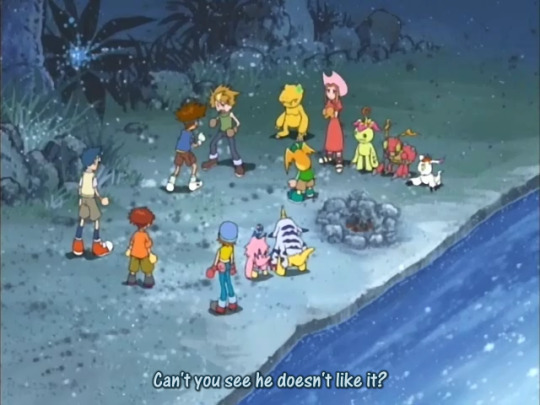
Yamato’s archetype is one that goes down to appearance -- the cool-looking, bishounen rival who advocates for a more “rational and cold” approach in contrast to the lead protagonist’s hot-bloodedness, who looks down on him for being stupid and irrational, and refuses to get near anyone due to looking down on them (or the concept of having friends in general). This is to the point where his own voice actor saw his design and immediately expected him to be this archetype to the point of worrying that he might not be able to pull off this role, only for himself to find out that Yamato is the exact opposite.
Yamato is, in fact, one of the most openly emotional and compassionate people in the entire original Adventure group, and given that Taichi is actually someone who often is too chill and doesn’t take things seriously enough, Yamato is actually the one who actively instigates fights with him and escalates things to physical levels, because he perceives Taichi as being inconsiderate. His first focus episode (Adventure episode 3) has him completely go off his rocker for Takeru’s safety, but while Takeru definitely elicits the most extreme reactions from him, he really does escalate fights immediately the moment he feels sufficiently offended on others’ behalf. So in other words, “rational and cold” are just around the last words you should be ever using for Yamato.
Moreover, what seems to be detachment from the others ends up ultimately just being a byproduct of awkwardness -- even as early as Adventure episodes 6 and 18, he had no problems openly laughing and smiling with the others, and it was just his prior lack of friends beforehand that made him unsure of how to open up to others. Adventure episode 51 has him directly say in words what his actual reasoning for his awkward behavior and friendless background was: it wasn’t that he didn’t want to be near others, he was just so obsessed with being independent and self-reliant that he felt that he shouldn’t be dependent on others. He liked others’ company, and he didn’t look down on them at all -- he cared a lot about the others’ welfare, he was just averse to the idea of actually being emotionally dependent on others, until he was able to be snapped out of that mindset and able to understand that relying on others doesn’t indicate a personal failing.
These kinds of characters usually are fueled by some kind of pride or condescension, but in fact Yamato doesn’t have that at all (in fact, you could more accurately say that it’s insecurity more than anything). Even when he openly breaks down into a crying mess in front of everyone (he has the highest cry count in Adventure, at that!), he doesn’t seem to have any shame about having exposed some of the rawest parts of himself to the others -- think about how this archetype would usually get embarrassed about people finding out they’re “soft” -- and there’s no evidence that he has any sense of superiority whatsoever.
By the time of 02, since he’s portrayed as having become openly sociable and cheerful, for all intents and purposes, the only thing he has left in common with the archetype is just the fact he seems to be really into a sort of edgy aesthetic. Otherwise, he’s just as emotional as ever, makes even some of the funniest facial expressions in 02, is on fantastic terms with Taichi (it is very important that the single punch he lands on him is purely in a sense to snap him out of it and not made out of anger or condescension), and, really, if you want to say that he has a responsibility of reining Taichi in, considering Taichi’s penchant for being a little too assertive about his decisions, it’s just in the sense of lightly reminding him not to get too ahead of himself, which is not any worse than keeping an eye on a cat with a track record of getting into willful trouble. This is especially because, after all, Yamato is someone who has compassion for others’ welfare and feelings -- and that includes Taichi, too.
Sora
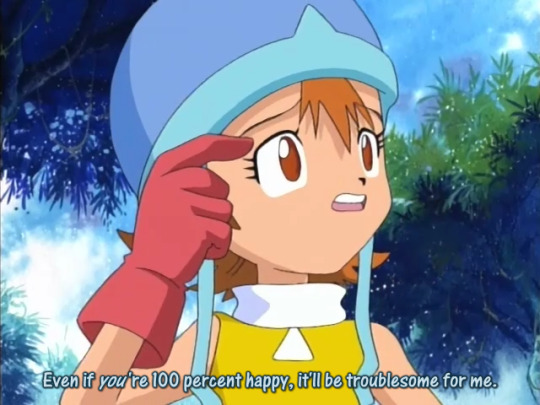
This kind of character is usually thought of as the “badass action girl”, especially since Sora is established as also being rather physically active much like Taichi, but one thing that often comes with this sort of character is that they often “have it together” all of the time and are seemingly implacable in personality. Adventure goes out of its way to indicate, even as early as episode 3, that while it is true that Sora has it together and is capable of pulling her own weight, she is also not a saint -- that is to say, she’s capable of having moments of pettiness, poor judgment, or irrationality like any other flawed human being. In fact, her first focus episode (Adventure episode 4) has her outright look down on Piyomon for being, in her mind, overly mushy and clingy and not really up for the job of protecting her, only to be proven very wrong at the end of the episode.
One thing Adventure and 02 don’t shy away from is the concept of “selflessness to the point of self-destruction” -- it’s good to be kind and considerate, but at what point are you doing so much for other people that you’re not properly taking care of yourself? In Sora’s case, the problem is defined as compulsive -- even when, in Adventure episode 26, she claims herself to be an inconsiderate person who doesn’t care about anyone and is incapable of love or affection, it’s revealed that, despite consciously thinking that, she’d still gone out of her way to help everyone behind the scenes in the last few episodes because she still couldn’t stop wanting to help people. Even her own flashbacks (and rather inaccurate testimony) about her past with her mother have a constant thread of her working for others’ sake more than she’s doing anything for herself.
In other words, being this image of a perfect, well-behaved, reliable person whom everyone can depend on no matter what is actually pretty unhealthy for her, because she’s capable of cracking under the pressure and not being allowed to be, well, a normal human being once in a while. Being that sort of person requires constantly catering to obligations (real or perceived) to others, which she’s unfortunately capable of falling so deeply in and not thinking of herself at all to the point she gets self-destructive. Because her problem with this is so bad, Jou and Yamato reaching out to her in Adventure episode 51 literally just involves reminding her about the sheer concept of personal will and volition, because without that, she’d basically considered herself a piece of the situation who does everything she does because that’s what she has to do.
And yes, indeed, a “lead” female character in this position would usually be played up heavily with the main lead male character, because media traditionally loves to hint that the sheer existence of a male and female lead with any kind of relationship whatsoever means that they have to be fated to be in love, but given the philosophy of not wanting to apply tropes unless there’s an in-universe rationale for it (of which “pairing the main male and female leads” is directly cited as one potential such trope), it is true that just because Sora knew Taichi from the soccer club and is usually the first-listed female character in Adventure doesn’t really necessarily indicate she should be obligated to fall head over heels in love with him (especially because they don’t interact nearly as much as you’d expect two characters with that kind of backstory to, and Koushirou, who’s also from the same club, hangs with him much more prominently) -- and in fact, when the issue of her love life does come up in 02, it’s treated as a very non-dramatic issue that becomes a background element of the narrative, which is not how you’d usually see the issue of romance or a love life usually treated in the kind of media that loves to bring that front and center most of the time. While the fanbase loves to treat it like it was some kind of love triangle, that kind of reading actually requires an extra dose of interpretation from a very ambiguously portrayed situation that ultimately isn’t given much fanfare by even the characters in-universe, because, really, two fourteen-year-olds dating is...rather commonplace and not actually that big of a deal, especially when compared to something like preventing monsters from blowing up the city.
Koushirou
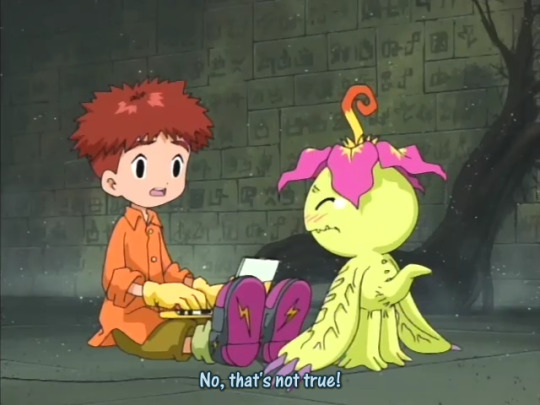
Adventure actually has two plays on the traditional “nerd” character, separating the archetype into one who’s good with data and random trivial information (Koushirou) and one who’s good at rote memorization and doing practical calculations that are good for school environments (Jou). So already, there’s a bit of subtle nuance in the fact it makes this distinction at all, in that there are different ways to be “smart” -- Koushirou’s depth of knowledge is significantly less practically applicable than Jou’s in most ordinary situations and isn’t tailored well to institutional expectations like school and exams, but he has a much wider range of things he knows about and ends up more directly pertinent in regards to his knowledge about computers and data analysis.
In any case, a “smart” character would often have an angle of being condescending, i.e. lording over others that they know so much more than them and knowingly being showoffs as a result, or actively disliking people and considering machines to be superior. In the case of Koushirou, however, it’s established that while he does have a certain level of intimidation around other people and find himself more comfortable around his computer, and while he can get absorbed in gathering information or rambling off about things because he’s passionate about it, he doesn’t actively dislike nor look down on others (rather, he’s actively intimidated by them, according to Adventure episode 38), and he states outright in Adventure episode 10 that he doesn’t want to spurn Mimi nor does he care about his computer more than he cares about others, he just genuinely thinks that what he’s doing right now will benefit even Mimi in the long run, too.
Koushirou may not be experienced in dealing with other people and may be a bit uncomfortable in high-pressure social situations, but at his core he’s a very kind and compassionate person who cares about others! The fact he’s constantly polite to others isn’t just out of awkwardness, but also out of a genuine desire to keep courtesy and distance, and as the series goes on it turns out he really is as polite and humble as he sounds -- he’s doing it because he’s shy, not because he considers himself above the others, and by Adventure episodes 38 and 54 he says that he would like to be able to speak more casually and be closer to others, it’s just that it’s going to take some time for him to do so. And even if he does mess up a social situation, if he’s informed he’s messed up, he’s easily capable of taking this to heart and trying to do better (which makes up all of Adventure episode 10 when he eventually realizes he went too far with Mimi). Just because he may not be fantastic at handling the fallout doesn’t mean he doesn’t fundamentally care or want to minimize harm to others. Not only that, he’s also one of the youngest in this group, and for all it’s worth, he shows every indication of being properly respectful of his elders from his position.
Moreover, while Koushirou is so heavily associated with his computer, the series doesn’t take long to establish that the computer really is not the focal part of his character as much as it’s the concept of “gathering and analyzing information”. However much knowledge Koushirou had gained prior to the series, and whatever tech skills Koushirou may or may not have (if you look closely, his tech feats aren’t actually that impressive within the scope of Adventure and 02, and a lot of what he does in terms of tech feats is heavily outsourced), are considered relatively unimportant in comparison to his actual attitude about it, which is that he never stops wanting to learn more or dig deeper into things whenever something’s piqued his curiosity. The conflict in Adventure episode 24 that establishes the true, functional meaning of the Crest of Knowledge has very little to do with computers at all, but rather Koushirou insatiably pursuing more about the Digital World itself and Gennai, and, really, the topic could be anything as long as it’s new and interesting -- it’s just that computers (especially ones connected to the Internet) are a convenient place to gather and analyze different kinds of information, and the Digital World happens to be an absolute treasure trove of new things to discover.
In other words, Koushirou knows a lot of things not because it gives him some status of superiority over others for being “smart”, but rather because he’s genuinely passionate about exploring and learning about things, and you can also see it in the difference between the way he approaches “gathering” information versus “disclosing” information. During times he’s focused on gathering or analyzing information, he focuses on it and tends to shut others out because he wants to make sure he’s uninterrupted and can get every little detail out of it, and whenever he’s talking to himself, others might sometimes get lost in his rambling, but whenever he’s put in a situation where it’s of importance that he explain to others (examples being Adventure episodes 19, 28, and 42), he clarifies when people have questions, sometimes checks to make sure everyone’s still following, and, in general, has no sense of condescension about the fact he knows more than them, with the implication that wants the others to be able to understand and appreciate the information he’s passionate about.
Koushirou is also one of the most visible seniors in 02, because as someone whose defining trait was “curiosity and inquisitiveness”, it stands to reason that he’d be the one most curious about what his juniors are getting involved with, what’s going on with the Digital World, and anything else to do with it (hence why he occasionally asks his juniors to test things for him, such as in 02 episode 17, and hauls himself all the way down to Tamachi to pick Ken’s brain about anything he knows in 02 episode 33). Again, like in Adventure, his character portrayal actually has very little to do with computers, despite what the imagery and archetype would suggest -- it’s more about how he’s now become able to take a leadership role like that of the computer club and start coordinating and organizing people to be able to figure out even more things, while also being able to personally unravel more of the mysteries behind the Digital World and the story itself.
Mimi
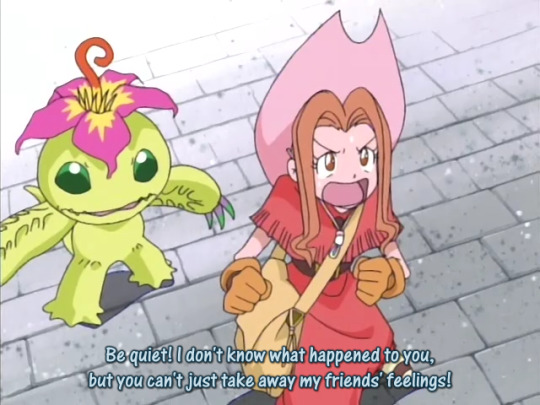
Coming from a background of being a bit pampered and spoiled, Mimi aligns a bit to the “pretty girl” archetype that generally has a few things associated with it -- someone who might be a bit materialistic or fixated on appearances, and someone who’s a bit condescending or high-horse in compared to others. So it’s interesting that Mimi is actually portrayed as, for the most part, not that absorbed about appearances or materialism (it’s not to say she doesn’t care at all, but any references she makes to appearance are vanishingly rare in the series, and she’s even willing to warm up to the Numemon or Scumon/Chuumon and not hold grudges against them), and in fact all of her “complaints” that she makes in the early parts of the series are meant to be in line with what an average child would have in her situation. Complaints like “I don’t like this” in reaction to little things like having to get dirty or endure something tiring aren’t complaints she makes because she looks down on it as much as she’s just had a very sheltered upbringing that hadn’t involved a lot of hardship, so now that she has to grit her teeth and go through a lot of difficult things, she simply has low tolerance and high sensitivity and is having difficulty coping.
Beyond that, Mimi is consistently portrayed as likeable and devoid of malice or condescension towards anyone -- so much to the point that even at the beginning of the series, she saw no reason to look down on Koushirou or make fun of him when her classmates did, because she didn’t see why she should. Mimi is said to be someone who is so naturally likeable that she has no problems making friends with anyone, which is why she’s the one who’s able to gather together allies at the end of Adventure -- because she lacks condescension or malice, and is compassionate enough to never get on the wrong foot with anyone, everyone ends up able to get along with her with no problem. As one of the youngest in the group, she’s polite to her elders and uses proper honorifics on everyone, and moreover any lashing out she does is purely defensive and not aggressive towards others. She lashes out because she doesn’t like herself or her friends being hurt, but otherwise she doesn’t care to do anything cold or rude towards others, nor have a grudge; her first focus episode (Adventure episode 6) involved her having absolutely nothing but "they don't seem like they're having fun" towards everyone making fools of themselves in front of her, and she even goes as far as to outright call them her “friends” at a time in the series when everyone barely knew each other! This is also why 02 depicts her as having already made a ton of friends in America (such as Michael, or the attendees of the huge party in 02 episode 14) despite having been there for only a year; she’s that likeable to the point she can get along with people from even an entirely different country easily.
Mimi is “extremely empathetic”, which means that she won’t cause harm or pain to others because she herself feels their pain when they’re in trouble or hurt -- the closest she got to being on a power trip was her “princess” mental health crash in Adventure episode 25, which almost immediately led to her having nightmares about everyone feeling betrayed and potentially hating her and turning around in less than one night. Hence, she won’t do anything to hurt others’ feelings, because she herself feels hurt if she does. However, that means that once the Dark Masters arc kicks in and many of their friends are hurt and killed in the process, her feeling every bit of that makes her the first to take it the hardest and become unable to fight (and, by extension, is very tied to that “extra sensitivity” that made her so sensitive to pain or unpleasant experiences at the beginning of the series). Mimi is consistently portrayed as a pacifist, and while many other shounen battle series would portray this as a weakness, Adventure episode 50 establishes that while it of course isn’t good for her to sit around doing nothing, it would be inhumane to force Mimi to personally participate in something that causes her so much pain, and instead may be better channeling her abilities to bring people together by amassing allies and contributing to the struggle in other ways. While Mimi does eventually get herself together enough to participate in the direct fighting in Adventure and 02, she never gets portrayed as someone who enjoys it for the sake of it besides the end goal of protecting others, and in 02 her ability to bring people together and not hold grudges is a much more significant influence on her juniors (especially Miyako).
As a side point, this kind of “pretty girl” character is often also stereotyped as being rather lacking in common sense or airheaded, but while Mimi certainly isn’t the paragon of intellectuality compared to some of the others in the group, she’s never portrayed as particularly lacking in common sense, and in fact her sense of empathy and sensitivity makes her very able to “read the room” and say things or act in ways that are in fact extremely helpful to others. “Emotional intelligence” is a fairly prominent character trait for many characters in Adventure and 02 (particularly in regards to Digimon partners), and, especially in a narrative where the characters are dealing with a lot of stress and emotional issues, is no less important of a role in terms of figuring out what’s going on and figuring out the best possible solution for everyone going forward.
Jou
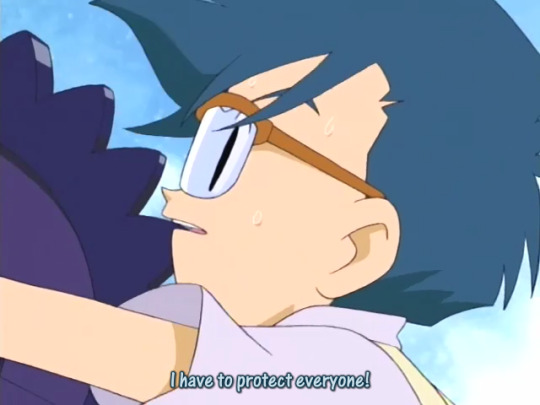
Jou’s got two archetypes going on here: one being the “studious nerd” type (touched on earlier in Koushirou’s section), and one as “the oldest and therefore most responsible” -- except we quickly find out that Jou is extremely stress-prone, often high-strung, and not particularly put-together (especially because, as it turns out, he’s actually the youngest of his own siblings, meaning he’s not particularly used to being in the role of the oldest). Nevertheless, he takes his role as the oldest very seriously, but the way it’s played is interesting: while he initially seems like the type to hold his position as “the oldest” over everyone and act as if they’re obligated to treat him with respect, Jou actually doesn’t have any indication of caring that much about status or esteem as much as he considers himself obligated to fulfill the role of the oldest and take care of everyone. Hence, why he’s willing to even throw himself recklessly on a Unimon in Adventure episode 7 -- he’s a very selfless person whose main drive is to protect others and help people more than he cares about his own status.
That extends to his role as a “studious” person too -- someone like him who comes from an “elite” family of doctors would often be portrayed as someone who themself cares about the prestige and honor of being a doctor, or at least is proud of being an honor student over everyone else, but there’s no indication in Adventure or 02 that Jou has any interest in the act of studying itself or the status that comes with it as much as he considers it part of a “comfortable routine” that’s integrated into his life, especially compared to the stress of being in an unknown world (Adventure episode 6 even has him preface his statement with “don’t laugh at me,” acknowledging how unusual it would normally be to miss something like studying). Adventure episode 35 has him be mostly rather unfazed about getting a bad grade, past an initial (understandable) bout of disappointment, hinting that this whole affair is actually him going through the motions moreso than he has any real attachment to this lifestyle. Jou doesn’t have a condescending bone in his body, and in fact a lot of his behavior has heavily to do with high stress and a feeling of obligation to help others.
Eventually, via his brother Shin, Adventure episode 38 clarifies the reason for Jou’s behavior of being the “studious type” yet also not really being into it all that much -- Jou’s doing this out of his obligation to his family more than he even personally cares about it, and the “elite” track of being a doctor was never something he personally wanted as much as something his father wanted of him. So in other words, Jou had no personal investment in status and thus can’t be motivated to do something with passion unless it’s something he personally has a reason for wanting to do. He certainly was very motivated to throw himself recklessly into situations where he could sacrifices himself for others in Adventure episodes 7, 23, and 36, because it was a no-brainer that he wanted to help people, but something like the status of becoming a respected member of society is comparatively nebulous and vague to him, especially since, as per Adventure episode 38, he has a phobia of blood that makes the profession outright uncomfortable to him.
Because Jou is the kind of person who wants to do his best for others’ sake and help others, it’s only when he rationalizes that with his father’s desire for him to be a doctor that he’s able to form a desire for it -- namely, the Dark Masters arc has him witness pain and death, and combined with him outright coming to terms with the fact that he's not that great at fighting to begin with (in Adventure episode 50), he decides that the Digital World is rather lacking in healers and that he needs to be there for them. Hence, why his goal to become a doctor is still “unexpected” in its own way, because he’s not doing it for the status of becoming an “elite” doctor the way his father wants him to, but rather one specialized in helping the denizens of the fantasy world that society isn’t all that aware of. It’s also why, in 02, he seems to be fairly unfazed by the prospect of having to temporarily ditch his studies in order to get Gomamon or his juniors out of a pinch -- because if he allowed there to be casualties on his road to becoming someone who can help people, that’d be pretty hypocritical.
Takeru
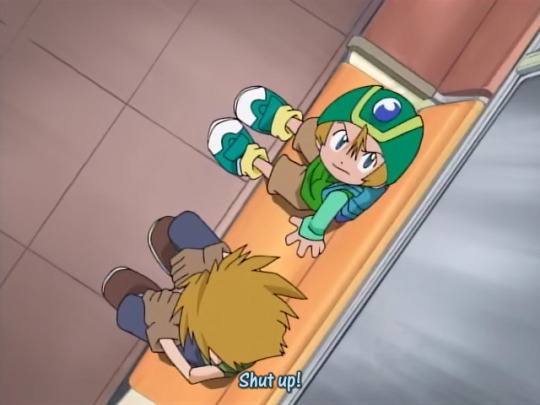
The “designated kid character” usually manifests in one of two ways: one who’s an immature brat who often causes a lot of trouble, or one who’s much weaker than the others and holds the others back from constantly being emotionally overwhelmed. While neither of these are really things you can blame a child for being at this kind of age for being (especially in such a stressful situation), Takeru is nevertheless neither. Mainstream media, and sometimes even people in the fanbase itself, will talk about him being a “crybaby”, but Takeru’s moments of breaking down into tears or having extreme emotional reactions in Adventure are actually quite uncommon (Yamato’s moments of such outstrip his by a landslide, and almost all of the situations Takeru ends up that way aren’t particularly more unusual than any of the other characters in this cast, especially Mimi).
In truth, Adventure episode 43 makes it clear that Takeru detests the idea of being a “ball and chain” holding everyone back, so, as a result, he’s going out of his way to be “put-together and well-behaved” -- hence, why he, as one of the youngest, keeps on his best behavior in front of his elders and has a constant sense of responsibility. Moreover, there are multiple indications that he’s covering up his own emotions to unhealthy extents as part of his attempt to be so “put-together” -- he has moments where it’s obvious he’s thinking about the impact of his parents’ divorce (a freeze-frame in Adventure episode 3, his reminiscence in Adventure episode 12, or his talk about dislike of “family” getting separated in Adventure episode 26), but constantly tries to veer away from the topic or even lie about it (see Adventure episode 12 where he basically pretends he doesn’t remember anything at all about his young childhood despite the fact that we as the audience are shown that he very much did).
The fact that 02′s incarnation of Takeru has him show a lot more viciously negative sides of himself may catch one off-guard, and it’s sometimes been said by observers that he seems to have taken a mysteriously nasty turn in his personality, but, in fact, Takeru’s habit of being dishonest about and hiding a lot of negative emotions had existed as early as Adventure -- observe him blowing a complete irrational fuse at the well-meaning Tokomon/Patamon in Adventure episodes 22 and 33, just because things had hit him a little too closely (the latter episode is especially notable because Patamon’s statement had been completely innocuous for the most part, only for Takeru to suddenly get angry at him). Such a thing isn’t something you would have expected from an eight-year-old child, given that the archetype is usually portrayed as “innocent”, but it had remained largely unaddressed by the end of Adventure, and it’s only natural it would have gotten worse over the three years in between Adventure and 02, especially as Takeru became older and more independent. When Iori points out the strange “duality” between the kind and cold sides of Takeru in 02 episode 34, he’s really just directly stating what had been going on since the very first episode of Adventure.
That said, it’s also not like Takeru’s trying to be dishonest or guilty of subterfuge -- it’s just that his coping mechanisms are very poorly developed and that he’s constantly trying to keep the peace and come off as pleasant while suppressing all of his negative emotions under a smile, only for things like anger and personal grudge to explode all at once at inopportune times (his punching of the Kaiser in 02 episode 19 being the most famous, but you can see traces of it emerging even beforehand in 02 episodes 11 and 13 whenever things get a bit too personal, to the point it almost jeopardizes his ability to help Hikari in the latter). Hence, why the positive development for Takeru by the end of 02 involves him becoming someone who’s better able to express his thoughts and feelings with the help of Iori, who, despite being younger than him, is also significantly more blunt and straightforward.
Hikari
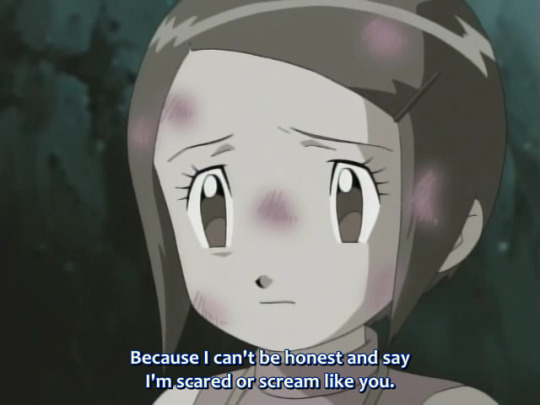
Being tied to a Crest that’s linked to “life itself”, Hikari comes off as the sort of saintlike figure who has purity of heart all the way through and has nothing but peaceful thoughts about everything. However, a lot of her appearances in Adventure were heavily impacted by context -- other than the fact she was sometimes held back by illness, Hikari was otherwise portrayed as an ordinary playful and cheerful young girl, and there are multiple layers to her character added or enhanced in 02 that indicate that she’s not quite the saint that her archetype would suggest.
For one, like with Sora, we again see how “excessive selflessness” can actually lead to self-destruction if left unchecked: Taichi states outright in Adventure episode 48 that Hikari’s penchant for putting others before herself means that she won’t do anything for herself even if it results in self-harm. Hikari herself confirms this in 02 episode 31, stating outright that she compulsively cannot express her own feelings even if she wants to, to the point she’s outright jealous of Miyako for being able to do so. Because she’s so inclined to not burden others and to work for others’ sake instead, when something bad is about to happen to her and only her, such as the Dark Ocean-related incidents, she can’t bring herself to do anything and is forced to either rely on others’ help or simply resign herself to her fate.
That said, Hikari is also not characterized as someone who’s passive in general; because this passivity is tied to “excessive selflessness”, anytime the issue has to do with anyone else’s sake, she doesn’t hesitate and will even be firm in taking a stand. She’s so assertive that she even momentarily freaks Miyako out in 02 episode 18! In the end, it’s a textbook case of “it’s easier to do it when it’s for other people, but harder to do it when it’s for yourself, especially when doing it for yourself means bothering others,” and this is also something that had dated back as early as Adventure, when she’d made a lot of fairly independent decisions about things she felt strongly needed to be done, like giving herself up for everyone's sake in Adventure episode 36 (very much against her friends' will), or standing up for the Numemon in Adventure episode 49, or even being much quicker to accept the inevitable need to kill an enemy than the emotionally wrecked Miyako in 02 episode 44, because they’re all things she truly and strongly felt needed to be done for the sake of others.
Plus, it’s also not like Hikari’s such a pure-hearted, saintlike person who can do no wrong even at the base level -- 02 episode 6 indicates that she’s not above toying with Daisuke’s feelings for her in order to get what she wants, and in general, the fact she’s aware he likes her but isn’t doing anything about it has both the nuances that she probably doesn’t want to hurt his feelings but is also capable of exploiting an extra level of leverage over him as well. The fact that Hikari is seen as “charming” gives her a certain degree of power of persuasion to get her way, and it seems she’s quite well aware of it...
As the younger sister of Adventure’s lead protagonist, Hikari’s often also stigmatized as having some kind of unhealthy fixation on her brother, or a brother complex (also a rather common anime trope among “younger sister” characters), but this kind of reading requires a huge amount of exaggeration and extracting the relevant lines out of context; at no point in Adventure or 02 is Taichi and Hikari’s relationship portrayed as particularly unusual relative to a reasonable level of concern a pair of siblings that get along should have, especially since any behavior that is particularly notable or unusual or dependent is strongly contextualized as having to do with the above issues regarding Hikari being potentially self-destructive if left to her own devices, and how both Taichi and Hikari react to it (hence why the problem is ultimately addressed most effectively by Miyako, who has no real personal stake in the siblings’ relationship).
Daisuke
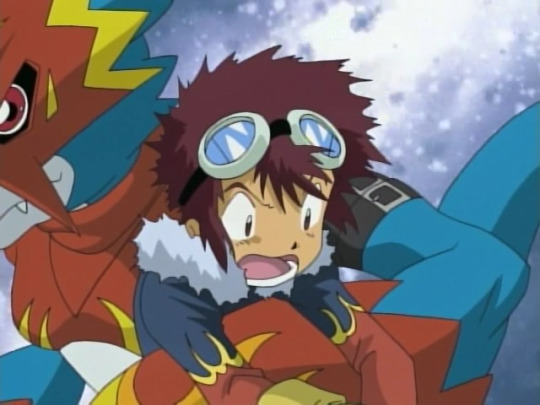
Daisuke has been stated outright by Adventure and 02′s director Kakudou to have “the most anime-like personality”, and it is true that even going beyond his base profile, a lot of his characteristics are much closer to that of an idealistic shounen anime protagonist than Taichi’s are, including (as the article in question points out) that he’s a lot more “hot-blooded” on principle but suddenly loses his head when around a girl he likes. Past that, however, there’s a lot of depth going on that reveals that Daisuke is in fact quite the deceptive character.
The first thing you might realize after watching Daisuke closely enough is that while he may initially seem aggressive, he’s actually not very assertive or aggressive at all, especially in the earlier parts of the series. It's very common for the others to shut him down or overturn his opinions in the earlier parts of the series, no matter how much he may ostensibly seem argumentative about it -- he very quickly backs down, at worst seeming a bit irritated, or even going into full-on disappointment with “Oh...okay...” Hence, why Kakudou refers to him as being “prevented from doing very much in the first half,” because for the most part a lot of the decisions made by the group in said first half are made by the entire group in agreement more than they’re made by him specifically, and becoming someone who can make more firm statements is a major point of his growth throughout the series. The first major moment he’s able to do such a thing is 02 episode 20, where, despite everyone’s opposition, he continues to assertively put his foot down that he doesn’t want to pull back when doing so could result in more victims -- and that ultimately becomes the start of him starting to be more confident about doing things even when others disagree with him. Even when he does become more assertive, at no point is Daisuke ever said, in-universe, to be the “leader” of the 02 group as much as he’s simply the one giving them the drive to move forward while they all work things out as a group.
Beyond that, another point that comes out of this is that Daisuke is actually a very deeply emotional person, which means that he has very strong emotions in every direction, including those of empathy and kindness. In fact, similarly to Mimi, Daisuke’s “abrasiveness” and “lashing out” are more defensive than him ever going on the attack, since he usually does this when he feels like he’s being put on the spot, or insulted, or is suspicious. There’s a reason I like to compare him to a puppy with a louder bark than its bite -- said puppy might bark at anything it doesn’t like or understand, or get pouty and offended at times, but also will immediately switch to open adoration or genuinely wanting to make you happy, and that’s also Daisuke in a nutshell. You may notice that he never, ever says anything condescending towards others nor does he dunk on them without reason, and 02 episode 7 indicates that if he realizes he’s stepped over the line, he won’t hesitate to apologize -- something that Taichi, who often veered into the insensitive, was rather bad at doing. Moreover, whenever something deeply hurts him, he also becomes genuinely, truly upset about it -- see him openly weeping over Wallace’s problems in Hurricane Touchdown despite having just met and bickered with him, and him being very audibly on the verge of tears during the situations in 02 episodes 20, 26, and 43 (Kiuchi Reiko’s acting especially brings this out). He’s a dramatic person with an extreme emotional reaction to everything, and that often means blowing small things out of proportion, but it also means that he really, truly does feel for others and care about things with large stakes.
In addition, someone who’s this sort of “hot-blooded” would usually also be portrayed as self-absorbed and arrogant, but Daisuke reveals as early as 02 episode 8 that he’s actually extremely humble -- he knows when he’s out of depth, acknowledges when others are better than him (such as knowing even from the very beginning that he was likely to lose against Ken and the Tamachi team), and actually just enjoys being around others on sheer principle. Read between the lines and you’ll realize that a lot of his behavior actually comes not from arrogance but rather insecurity -- he doesn’t expect anyone to adore or respect him, rather, he ends up running himself in circles trying to impress others (especially Hikari) because he wants the validation of them considering him cool. Hence why he never looks down on anyone nor insults anyone, because he’s much more confident in their awesomeness, and every time he’s around elders or respected seniors, he immediately takes a much more well-behaved and respectful tone in general. For all it’s worth, he’s a pretty deferential person, and has a genuine appreciation for even the little things in life, which is why he’s okay with running a ramen cart in the future -- sure, it’s not super-flashy as a career, but it makes him happy, and that’s all he wants.
So in other words, Daisuke likes people, and he likes his friends a lot; it’s just that his tendency to need validation from others, combined with his emotional tendencies to get really dramatic about everything, makes for a surface temperament where this isn’t immediately apparent. Even his original motivation for fighting comes not from liking fighting, but from his frustration that he wasn’t strong enough to protect others three years prior (also reiterated in the Adventure novels). In the end, pretty much everything he does comes from a desire to protect others and help them, which means that he of course resents those who hurt others, and it’s why he takes Ken exploiting his otherwise admirable abilities for harmful purposes so personally in 02 episode 8. Hence why Kakudou described him as having no evil in him, and that “the only thing bad about him is his head” (i.e. he’s not very smart) -- because once you get past the initial abrasiveness, he’s extremely friendly, all-loving, and loyal, and he isn’t malicious nor does he hold significant grudges.
Even Daisuke’s penchant for being “an idiot” is played a bit differently from the usual, because it’s consistently shown to be a byproduct of the fact that he’s “simple-minded” and doesn’t do well with complex thinking or overthinking, which, in many ways, is an asset as much as it’s a drawback. It means that he doesn’t do well with complex problems and isn’t very intellectual, and it also means that he gets overly suspicious at things that aren’t what they seem or aren’t being straightforward (which is why he initially gets so antsy around Takeru and Wallace, especially the latter, whom he was suspicious of before he started flirting). But it also means that he won’t easily get distracted by platitudes or overthinking, which, during situations where the simplest answer is the correct one, will sometimes conversely result in him being the smartest person in the room. Being so simple-minded gives him a certain degree of pragmatism; while everyone else is getting caught up in moralistic issues of forgiveness or non-forgiveness, Daisuke, who doesn’t get hung up on things like grudges, becomes the most open-minded towards Ken because he practically observes that Ken is not causing problems anymore and thus should be allowed to take responsibility for his mistakes, and also successfully dissuades Ken from recklessly throwing away his life in 02 episode 26 because, as “symbolic” as that kind of penance might be, it’s also very unproductive and will make things worse for everyone. It’s also why he’s one of the first to emotionally come to terms with the potential necessity for killing enemies in 02 episodes 25 and 43; it’s not like he enjoys it, but he’s the first to point out that if they hadn’t done it, even more victims would have been taken.
And as for Daisuke’s interest in Hikari: it’s basically there as a character note as to how Daisuke will completely lose his brain cells and bend over backwards when he’s trying to impress someone he has on a pedestal, and it becomes completely irrelevant to the plot and not even brought up after 02 episode 35, so while it’s not something that vanished completely (especially since it makes a return in post-02 material), it’s also treated as an example of one the many weird hangups that Daisuke will put aside when other things become more important, and an ultimately fairly shallow thing that he hasn’t thought through very clearly (he never directly asks Hikari out nor verbally expresses having a particular crush on her at any point in the series because he’s so wishy-washy about it, which is why she’s so easily able to dodge it), rather than a guiding part of the narrative or his character.
Interestingly, Daisuke’s unusual position as a shounen lead is hinted at even in franchise meta; you might notice he’s the only lead Digimon protagonist to be so heavily associated with blue instead of the warm colors of orange or red, and when you think about it, despite having Taichi’s goggles and supposedly having the “hot-blooded” personality, you could draw just as many parallels between him and Yamato, who’s also friendly behind all of the initial awkwardness and is also a passionately emotional person.
Ken
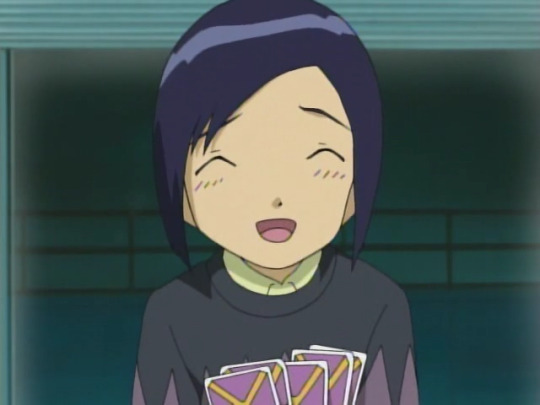
Really, the single most unusual thing about Ken’s character and his character arc is the fact that such a plotline even exists in the first place. How many series would take the main antagonist of the first half (not an underling, but the actual primary antagonist) and not only reform them but also turn them into the best friend of the protagonist for the second half? And not even in a “begrudging edgelord rival” sense, but legitimately the person who becomes a straightforward best friend with no standoffishness and full-on social-life supportiveness to the protagonist?
In any case, the entire concept of the Kaiser and his story is unusual even from the get-go -- we’re initially introduced to him as an “evil genius”, which is a common villain archetype because it’s very terrifying to have an enemy who’s one step ahead of you, but the Kaiser ends up being rather pathetic -- he’s constantly losing territory to a group of elementary school students, his “tactical abilities” have no real sense of scale beyond a soccer field sort of affair, he’s incredibly petty and will make irrational decisions just because his pride was wounded (see 02 episode 8), and seems to have no real long-term goal besides conquest for the sake of it. Eventually, 02 episode 20-21 reveals that he’d been doing this entire thing because he’d thought the entire thing was a game -- in short, he wasn’t taking this seriously at all, and the entire affair had been tantamount to an eleven-year-old throwing a tantrum.
The point being made here is that the facade of the so-called “evil genius” is significantly less brilliant than it’s made out to be, and, actually, when you think about it, Ken’s initial reformation is mostly kickstarted by himself and Wormmon moreso than it is the other Chosen Children, because while they’re there to drive the nail in, Ken had already been emotionally falling apart and realizing he wasn’t cut out for this for the entirety of the last handful of episodes, and it was ultimately his own realization and mental breakdown that did the honors -- the other kids were really mostly doing cleanup duty at the time, and Daisuke’s influence on him is more important to his process of healing than it was the initial calling it quits. Moreover, as we get to see Ken more in his proper element in the latter half of the series, it becomes apparent that the “true personality” of Ken is actually the more assertive, level-headed one, whereas the Kaiser was the childish and fragile facade; Ken is significantly more comfortable being in his normal element to begin with, and he’s not standoffish or edgy because he doesn’t even like being condescending. If anything, the Kaiser was a manifestation of him forcing himself into an uncomfortable mold in an attempt to emulate his brother, so of course he isn’t going to feel comfortable doing that once all is said and done.
While Ken in the second half does initially express some traits that can be misconstrued as standoffishness, because he’s significantly more level-headed and assertive in this state, it becomes clear that he’s not doing this because he looks down on the others or anything; it’s just that he has very strong opinions on what he thinks needs to be done, and he doesn’t hesitate to explain why he feels this way when he’s asked (he says outright in 02 episode 25 that he believes they shouldn’t be responsible for cleaning up his mess). 02 takes a stance of favoring the concept of “taking responsibility for one’s mistakes” over “penance and punishment”, so even though Ken himself does have moments of devaluing his own life due to his sins (such as in 02 episode 26), ultimately, he states that his primary goal is to fix the mess he started, and he’s not averse to working with the others for the sake of that goal. If he does initially push the others away, it’s simply because he thinks he’s burdening them too (and, likely, that he doesn’t feel he has the right to be around them), but even when he’s at his most irrational about this in 02 episode 30, he turns out to be fairly capable of being reasoned with in pretty short order. So he’s not standoffish or “edgy” just for the sheer sake of it nor for drama, and it’s why he ends up on a very conciliatory relationship with Daisuke and the others by the end of the series, with very little, if at all, in common with the usual “rival” archetype you’d expect in this kind of series.
Considering that Ken is characterized as “kind” and “soft”, it’s easy to not realize that he’s actually one of the most assertive people in the group, and more so than Daisuke (note that he never seems to be all that easily intimidated even when the universe seems out to get him, and in 02 episode 29 he even offers to do the “dirty work” of potentially having to kill an enemy in lieu of the other kids if push comes to shove because he knows they’re uncomfortable with it). Although the issue of the Dark Seed makes it ambiguous as to how much of his turn into the Kaiser was supernatural interference and how much of it was himself, either way, the series doesn’t try to absolve Ken of his sins just because there was something extra pushing him over the edge -- again, the series operates less on “fault” than it does “responsibility” -- and when you look at these kinds of traits, you realize that the Kaiser existed because Ken had always been capable of this kind of aggressiveness, he just doesn’t do it because he doesn’t want to unless it’s necessary, nor does he like it. It’s also why he banters so playfully with Daisuke in most post-02 material -- like many of the other characters in this narrative, being “soft and kind” doesn’t mean he’s necessarily a saint, he’s just someone who willfully chooses to be a good person for the most part.
Miyako
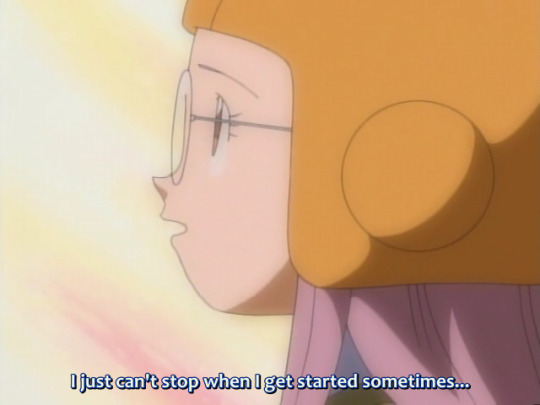
Miyako is a character who has a lot going on with her at once, having a ton of traits that you normally wouldn’t see combined into one character because they usually occupy separate archetypes (and, in a textbook case of reality being a lot less clear-cut than fiction, she’s the one character out of this group said explicitly to be based off a specific person). The fact she’s outwardly aggressive may make you think of the “badass action girl” type, but she’s also the kind who gushes over hot guys and fits the stereotypes of the “materialistic girly-girl”, and on top of that she’s a computer specialist working under Koushirou who begs the image of a “nerd girl”, and, unlike all of these archetypes, she’s a rather sloppy mess of a person who ends up loudly running her mouth, being prone to panic, and spitting out the first thing on her mind without restraint. On top of that, these traits tend to mix easily, so as much as she’s in-your-face about trying to physically fight things, she’s also the kind who’ll aggressively hug or dote on anyone she likes (which is a lot of people). Miyako is closer to the shounen brash hero archetype than even Taichi or Daisuke are, and yet is also closer to the “materialistic girly-girl” archetype than Mimi is at the same time.
Much like Koushirou, the part about being good with computers is much less of a prominent part of her character arc than you might initially think -- she herself doesn’t actually bring it up much during the course of the series, and, much like computers are an outlet for Koushirou to follow his thirst for knowledge and insatiable curiosity, Miyako’s connections with computers and tech have a lot to do with how she constantly goes out of her way to be helpful to others, such as being helpful to Koushirou as his junior, or helping out Iori’s mother with their computer (02 episode 1), or helping Yamato’s band (02 episode 29), or getting to do something helpful for the group in general (Diablomon Strikes Back). She’s not particularly show-offy or even all that fixated the actual subject as much as she’s proud of the fact she got to do something helpful and useful, and it ties deeply into her personal struggle with how to be capable of doing good for others when she’s actually not the striking image of a mature, put-together person who would usually be good at that kind of thing.
Miyako is consistently portrayed as having a complex about her “aggressive” tendencies -- she negatively compares herself to Mimi (02 episode 14) and Hikari (02 episode 31), on the grounds that she’s less put-together and more insensitive than them, and labels herself a “bad partner” for being such a sloppy person (02 episode 18). She does not want people to get hurt because of her actions, especially because whenever she loses grip on herself like this, that’s something that’s very liable to happen (which is exactly what happens with Hawkmon in 02 episode 18), and her tendency to be judgmental or to have no brain-to-mouth filter means she can be occasionally insensitive (see 02 episode 31). She even ends up fostering an idea that Hikari must be thinking of her badly, while she’s at it (02 episode 31)!
The end result of Miyako’s character arc is that, while she ends up needing to adjust the more negative aspects of her personality that involve causing trouble for others and being insensitive, that doesn’t necessarily mean that she has to completely change her personality to accommodate that. Hawkmon assures her in 02 episode 18 that he likes her the way she is, and, as it turns out, Hikari and Miyako both realize in 02 episode 31 that Miyako’s in-your-face, aggressive personality is very helpful when dealing with someone who’s so closed-in and repressive like Hikari, because it means Miyako has the right temperament to go out of her way and reach out to her despite how high of a hurdle that would normally be. On top of that, a consistent thread from the beginning of the series is that her over-the-top antics bring the group proper cheer, with the kids genuinely enjoying the vibrance she brings with her dramatic Digital Gate entrances, and multiple significant scenes indicating that her being dramatic and silly will make people laugh and be happy. So in other words, Miyako is capable of being emotionally supportive and helpful while also being her aggressive and messy self, and there’s no need for her to have to change herself drastically to resolve the supposed “contradiction” that one might initially think this poses.
Miyako’s also generally the first female character billed in 02 (mainly because Hikari’s returning from Adventure), but she isn’t particularly teased as having any romantic relationship with Daisuke; not that they don’t have a compelling rapport, but any idea of them having any real feelings for each other isn’t exactly stated to any significant degree over the course of the series. Miyako herself comments on multiple people being attractive over the course of the series, and it’s interesting in how this is played; the earlier parts of the series involve her completely losing her head and getting weirdly hung up and fixated on her targets of attraction to the point of getting derailed over more important matters (see 02 episodes 6, 8, 14), whereas she’s later able to express this in a lot more straightforward of a manner without being weird about it (02 episodes 38, 39), and so in the end, it’s not exactly a fundamental sin for Miyako to be open about the concept of attraction, especially as it ends up not really having a huge place in the overall narrative, which is consistent with Adventure and 02 not really treating romance or attraction as if it’s such a game-changer for these kids at this point in their lives.
Iori
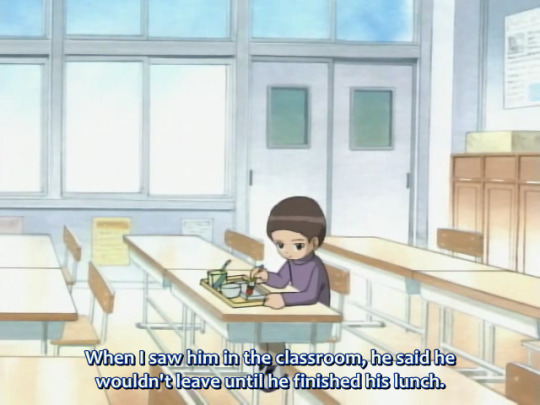
Iori is the youngest in this entire group of twelve, and yet carries himself with a sense of maturity that goes far beyond his age, to the point he even comes off as one of the most mature in the 02 group despite being younger than all of them by a significant margin. Even taking into account the concept of the “precocious kid”, however, Iori’s not only polite but also very stoic and stern, meaning he often can come up with some really passive-aggressive or stern remarks (completely in polite Japanese). Of this entire group, the youngest one is the most likely to completely roast you with some well-timed statements.
However, one important fact to keep in mind is that Iori isn’t doing this because he’s “naturally” stoic or emotionless, but because he’s deliberately suppressing himself in an attempt to be well-behaved. (A really big clue in the Japanese version that Iori’s facade is “slipping” is that he ends up losing his composure and using casual Japanese instead of the polite form that he so constantly adheres to.) This is something that partially comes from his upbringing from his family, especially his grandfather, but even said grandfather is concerned that he’s a bit overkill in this regard (see 02 episode 6). By all means Iori should be allowed to express himself a bit more freely, but he keeps restraining himself and trying to be well-behaved in front of all of these elders that he develops a complex over the one time he allowed himself to act excited and cheerful in 02 episode 16, to the point the episode ends with Submarimon basically dragging him out on an undersea trip so he can enjoy something for once, dammit.
Iori is described as “clumsy at expressing himself as a child”, and 02 depicts the problem that comes out of the flip side of a young child being so mature that they have more comfortable company with older kids than kids their own age: Iori is outright isolated from his peers because of how different his mentality is from theirs (02 episode 3), and moreover, his stubborn insistence on doing things a certain way to the point even his grandfather thinks he’s overdoing it is, in fact, his own way of being “childish”. He’s basically trying to follow the honorable principles he wants to follow from his family, but taking them to their logical extreme because his view of the world is too simple-minded from his lack of life experience. Hence, why he develops such a black-and-white view of morality trying to categorize people into boxes of “good” and “evil”, and why he ends up trying to follow principles to pretty impractical extremes such as thinking that a single white lie is going to send him on a path to moral debauchery. In short, he’s a young child trying to deal with very abstract concepts much bigger than him, and dealing with it in a very simple-minded, overly reductive way befitting that of someone his age.
However, one thing Iori does acknowledge is that he’s probably not going about this the right way, and that he needs to understand more about others if he wants to do better. From the very beginning of the series, Koushirou (02 episode 2) identifies him as someone who has a “curious mind” like himself, but while he initially expects Iori to be like him in terms of being curious about the Digital World, Iori’s “curiosity” ends up manifesting more in terms of wanting to know about how humans work and what’s the right thing to do. This is how he ends up breaking through to the very convoluted and repressive Takeru, because he has the drive to poke through Takeru’s many layers and figure out what’s going on with him, and it’s how he eventually manages to become more open-minded about the issues surrounding Ken and Oikawa despite initially having been so hostile to them. All things considered, “understanding morality” is a pretty heavy burden for someone who’s supposed to be the designated kid character!
160 notes
·
View notes
Note
When do you think Buffy and Spike started developing feelings for each other? I think for Spike it started in season 2 which has been kind of confirmed by Dru, but what about Buffy? Their relationship seemed to change after Spike let Glory torture him to protect Dawn, but I like to believe Buffy had unregistered feelings for Spike way earlier. I don’t know what’s true though. She let him live many times when she shouldn’t and that could just be the writers wanting to keep Spike but it could also be read as Buffy not wanting to kill him for some reason. If I were Buffy I would have at least been attracted to him from the start but I’m not Buffy. What do you think?
oh god. i started writing this and it just got more and more unhinged until i was left with a novel. but here’s my headcanon under the cut.
i think for spike it started in season 2, yeah. kind of immediately. i mean in his second episode he already has like ten tv’s mounted on the ceiling to obsessively watch buffy fight? ok weirdo. obviously the writers weren’t planning on spuffy at the time but it all fits with the dru retcon in “fool for love”. i think any feelings he had were super repressed in him for a while though, and were probably closer to obsession than anything (where does one draw the line between obsession and love? much to think about!!). tbh, and maybe this is controversial, i kind of think it’s not until “intervention” that he really understands just how in love with her he is, or what it really means to be in love with her. he definitely thinks he’s in love, he has a raging, identity-crisis crush, but i don’t know, something just feels different after that episode. i feel like it’s when his feelings for buffy really become less about him and more about her. like, less about having her or wanting her to recognize him, and more about wanting to be what she actually needs. less about *loving* buffy and more about loving *buffy*, maybe. so even though his feelings before then are real, they feel real in a different way to me after “intervention”.
buffy is harder. personally, i don’t think she was ever consciously attracted to spike until maybe s5. (buffy being immediately attracted to him in fic is actually a huge pet peeve for me; it doesn’t feel in character at all and can even make me stop reading). i think there was latent attraction, but spike was just so far outside the bounds of who she thought she would be attracted to that it doesn’t register that way (reason #34095 spuffy is a lesbian ship, obv. also it’s why her being attracted to him immediately can turn me off in fic, bc it makes the relationship feel less gay, and that’s kind of important to me). i think she finds him tacky and annoying and lame and just not a sexual object. he’s a soulless vampire and you don’t sexualize those. and so anything sexual she felt toward him she dismissed the way you might dismiss a weird sex dream about someone you’d never want in real life (jane espenson apparently had notes on her desk pre-s5 saying buffy had sex dreams about him, which i totally buy, especially after “something blue”). i think one of the reasons she freaks out so bad in “crush” is that suddenly spike isn’t in the non-sexualizable category anymore. like, what, vampires and slayers are sexualizing each other now? like in real life not just innuendo? you broke the rules, what am i supposed to do now? it’s why she’s so weirded out when he tries to kiss her in “fool for love” and goes on about how people can’t love without a soul in “crush”. spike isn’t fitting his sexual category and she doesn’t know how to deal with it so she tries to stuff him back in. long story short, i think it’s only after “crush” that she actually consciously thinks about his attractiveness, because before then he just wasn’t someone on the table for her to think about that way.
(oh i should also add—i think spike’s “crush” moment with buffy is “who are you?” when faith comes onto him. because it was sort of a similar thing for him. even though he was attracted to buffy before that episode, it was something he repressed or treated as kind of a game. innuendo and eroticism as a battle tactic but not something you’d actually follow through on in real life. but he thinks buffy breaks the rules in “who are you?” and suddenly makes herself real-life sexualizable. so i think his attraction becomes more conscious after that, even if he’s still trying to act like it’s something that disgusts him, like buffy post-“crush”.)
(also, this is why it’s so easy to read violence and murder as sublimated desire in a gay way with spuffy. it’s not really about murder and violence. it’s about them expressing romantic/erotic desire within the bounds of what their roles allow, because they can’t conceive of each other in other roles.)
but i do think buffy did still have some sort of draw to spike before s5. i feel like instinctually she saw him as more of a person than other vampires pretty early. definitely not consciously, and definitely wasn’t love. but she talks to him like he’s a really annoying guy more than she talks to him like some sort of mindless enemy. she doesn’t bother telling other soulless vampires that she violently dislikes them, or mock them about their breakups. i think the only other soulless vampires she sort of treats that way are harmony and holden in cwdp, which makes sense since both of those are vampires she knew before they were vamped. she didn’t kill harmony either, and wasn’t excited about having to kill holden. but spike is the only “stranger” vampire she sees that way, and i think that’s interesting! i think a lot of her conflict over him is due to this too, tbh. he instinctually feels like both a person and not-a-person to her, and that’s hard for her to process.
i have zero canon to back this up, but i think the first time buffy kind of sort of falls in love with spike is in “the gift”, when he says he’d protect dawn until the end of the world. i mainly think this because i don’t think it can be understated how important dawn is to buffy, or how telling it is that she kisses spike in “intervention”. other people have said this, but she just doesn’t kiss people every time they do something nice for her. i don’t think she would have done that unless she felt some sort of latent *something* for him, and unless he’d done something that really deeply affected her. him being willing to sacrifice himself for dawn’s sake, or protect her above all, affects buffy first: because of how self-sacrificing she is. she’s always the one who has to die or put herself on the line for other people. and second: she’s the only one who cares about dawn the way she does. no one else goes into a coma or threatens giles or vows to protect her until the end of the world…except spike.
so the fact that spike would understand the self-sacrificial and protecting-dawn parts of her, or help her with them in the same unthinkingly committed way, when no one else is, i think hits her where she lives. he understands and is not just supporting, but *embodying* this hugely important thing to her at the time when it counts the most. so she falls a bit in love with him. maybe just a second, or a minute, and then she ignores it and saves the world. but that’s the first time it happens.
then as far as s6 goes, i pretty much take buffy at her word when she says she has feelings for him, but that they’re not love. i think she has really intense and confusing emotions around him and for him, but they just don’t cohere into something that could be called something clear-cut like love. and that’s sort of the tragedy of that season? it has all the potential and intensity and chemistry for love, but she doesn’t like or trust herself and she doesn’t trust him, and he isn’t in a place where he can understand the guilt and self-hate she’s going through, or be moral without her guidance, and so in a lot of ways her lack of trust really is justified. so it just can’t quite reach the realness of love, where you want and want to care for the other person’s whole self. but (adding this edit based on a comment by marinxttes!), i totally agree that a lot of her breakup with spike is about her feeling enough for him that it doesn’t feel right to use him anymore. i think that’s the decisive moment when she stops being confused about whether he is or isn’t a person (and whether *she* is or isn’t), and decides he is one. maybe not one she thinks she can love yet, but one she genuinely cares about doing right by, and that’s a huge shift.
i believe her in s7 too when dawn asks if she loves him and she says she feels for him. i don’t know when exactly that whole mess starts cohering into something that really is love for buffy, but i feel like it’s happening the whole season. like air condensing into water. all the pieces have been there, amorphously, for a long time, and finally they’re allowed to take form. so when she says “i love you” in “chosen”, it’s at once something new, and also something that’s been there all along.
#ship: spuffy#do i have evidence to back up 90% of this? no#am i going to post it anyway? absolutely
232 notes
·
View notes
Text
Why The Believer is my favorite episode of The Mandalorian
There are a lot of unforgettable moments in The Mandalorian. Maybe your favorite episode is the season 2 finale, with those iconic Chanel boots. Maybe your favorite episode is The Jedi, with Ahsoka and her Thrawn teaser. Maybe your favorite episode is the finale of season 1, with IG-11′s sacrifice. All valid choices! But my favorite episode is S2E15: The Believer, and I’ll tell you why.
From the very first episode, Din’s relationship with being Mandalorian and the Code is framed as religious. He kneels in front of the forge while the Armorer makes his pauldron, he speaks formally to her, and lays the beskar and the payment for his last bounty out like an offering.

It’s also not difficult to see parallels between covering your face and some real-life religious tenets (though these are imperfect parallels and be careful how you use them). As someone who follows a specific dress code due to my faith, I definitely immediately related to Din as a religious person.
Din’s devotion to his faith is, for the most part, positively framed in the show. The Creed’s emphasis on protecting and raising foundlings is a large part of why Din decides to rescue Grogu from the Imperials. In the prisonbreak episode, Xi’an suggests that it might be his Code that has made Din soft. In S1E4, Omera is tremendously respectful of Din’s faith even when it means he has to turn down her affection.
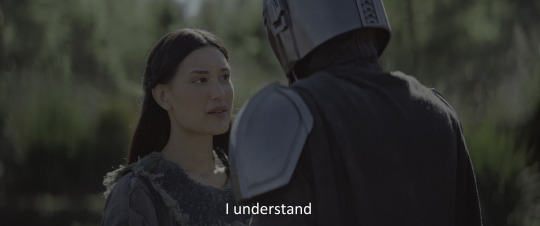
His devotion to the Creed is what sets him apart from other bounty hunters. Sure, he’s a brutal, harsh man more than capable of violence, but he also has a strict code of conduct by which he lives his life.
Then we reach Chapter 6, an episode that felt painfully familiar to myself and many other people of faith, I’m sure. The way Mayfeld asks Xi’an if Din ever takes his helmet off, as if Din isn’t right there in front of him. The way Xi’an mockingly parrots, “This is the Way.”
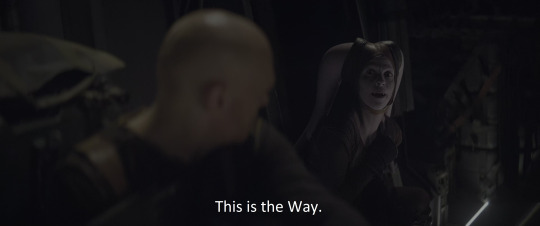
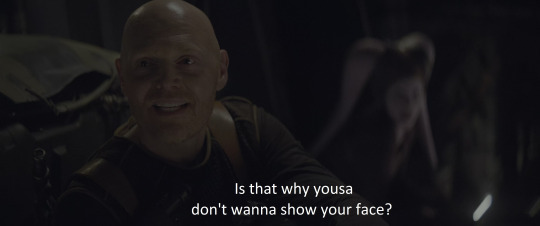

My situation obviously isn’t exactly the same as Din’s, but these scenes remind me of the prying questions, the teasing pressure to break my religious commitments, the mocking of beliefs I hold sacred. It really hit home.
Then things get complicated in season 2 when we find out that other Mandalorians consider Din and the Death Watch a cult.
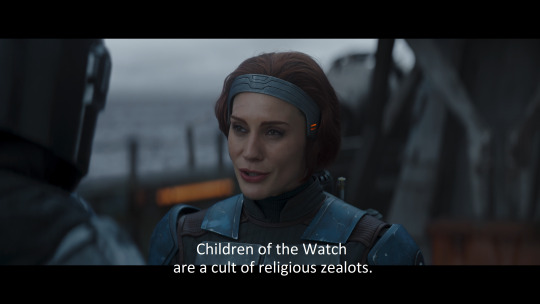
I appreciated this in the sense that it demonstrates the wide variety of beliefs even within the same religion--but at the same time it had me worried. Was this going to be yet another “losing my religion” story? Was this going to be a tale of disillusionment and breaking free of Din’s restrictive past? I’ve seen a lot of stories like that before, and I was hoping to see something different.
Even before Din meets Bo-Katan, we see him gradually softening his adherence to the Code. He starts off meeting Cobb Vanth by challenging him to essentially a battle to the death for wearing Mandalorian armor, then cooperates for the rest of the episode with him to defeat the Crate Dragon. They part ways as friends.

In S2E6, Din is upset when Boba first demands the Mandalorian armor, but he’s not very difficult to convince to accept Boba as the owner of the armor after they fight together.
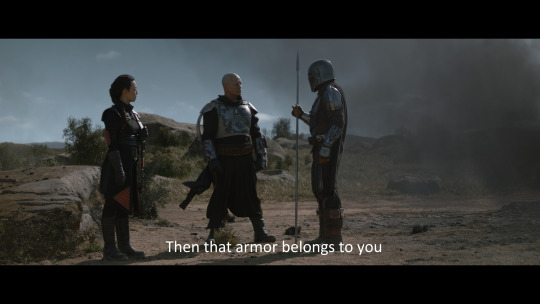
As a viewer who loves baby Yoda, we’re happy to see him make exceptions to keep Grogu safe. But as a person of faith, I was a little worried about where this might be headed and how it might undermine what I saw as a very positive message in season one. Then we get to Season 2, Episode 7: The Believer.
Right off the bat, Din sees himself forced to stretch the limits of his adherence to the Code in this episode. He goes with Mayfeld into the Imperial facility, covering his face with the helmet of an Imperial driver. Mayfeld immediately picks up on the inconsistency.

He picks right back up with the mockery and not-so-subtle digs.
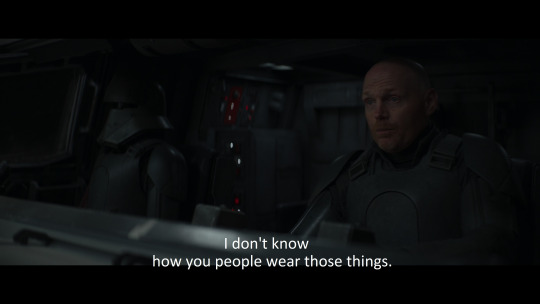
Then we get a bit of a peak into where Mayfeld’s derision is really coming from. Yes, Mayfeld is speaking aloud the insecurities that Din is facing himself--the doubts about whether it actually means anything to live by his Code, the question of if his chosen way of life actually makes any difference. But Mayfeld is also revealing the source of his own derision as well.

See how the focus switches to Mayfeld? How his voice gets soft and he’s looking off into the distance? This is a man who is talking to himself. This is a man who’s trying to convince himself that every bad thing he’s done in his past is fine because everyone is equally guilty.
When faced with the terminal that requires a facial scan, Mayfeld actually tries to protect Din in his own small way by not even asking him to scan his face.
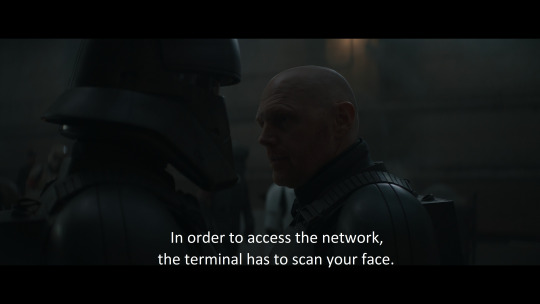

Mayfeld then hesitates to help Din when Din’s having a hard time with the terminal. He peeks in on Din, and you get the sense that he’s actually hesitant to disrespect Din’s code by looking at his face. Of course, when Din is confronted by the Imperial officer, Mayfeld steps in to help.
Then they talk with the Imperial officer who actually believes what Mayfeld acted like he believed before. That they’re all the same. That all moral codes--or lack thereof--are equally flawed and that therefore nothing matters. This is when we see the guilt that Mayfeld has been trying to hide all this time--the guilt that Din and his strict Code constantly remind him of.
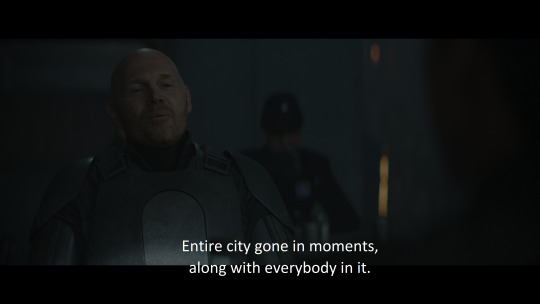
This is the moment that has been haunting Mayfeld--one of perhaps many atrocities that weigh heavy on his soul. And as a viewer you can see how differently this event sit on his heart versus how it sits on the officer’s heart.
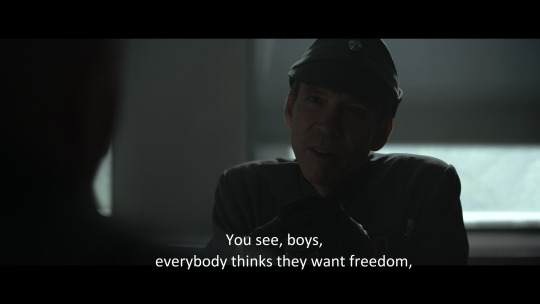

This is very reminiscent of what Mayfeld said earlier in the episode, but we can see that this officer genuinely believes it, while Mayfeld does not.

And this is where Mayfeld reaches his breaking point, where he can’t keep pretending that he doesn’t care or that everyone is equally bad.

And this is when Mayfeld turns from critic into ally and protector. He respects Din’s integrity, he understands that being imperfect doesn’t mean it’s not worth it. And this is what I was so happy to see. I was afraid that as soon as Din took his helmet off, the story would suggest that he’d finally seen the light and broken free of his restrictive Code. And yes, Din is likely going to be more liberal with his adherence to the Code in the future. We see this when he takes his helmet off in the next episode to say goodbye to Grogu. But he isn’t throwing it away.
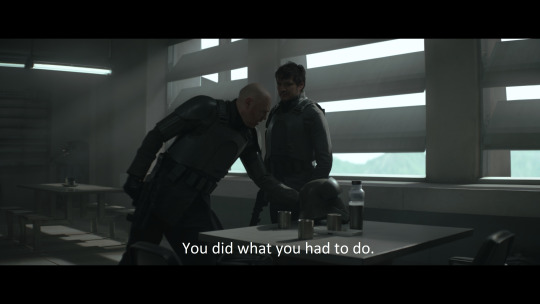
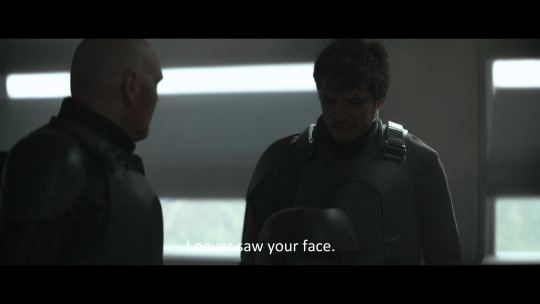
So what’s the message of The Believer? To me it’s that faith is messy. Faith often involves evolution. In fact, faith generally requires evolution. But just because you mess up, just because you’re a hypocrite, just because you can’t always live up to your ideals, doesn’t mean that you shouldn’t have them.
And we can separate this from faith, too, if you want. Think about what’s right and wrong, examine the way you live your life, develop a moral code. It won’t necessarily be perfect, and you won’t always live by it, but at least you’ll have something. It’s always better to try than to give up.
And in Mayfeld’s immortal words:

#the mandalorian#din djarin#mayfeld#migs mayfeld#star wars#star wars meta#the mandalorian meta#meta#religion#faith#i spent way too long on this
93 notes
·
View notes
Note
"A couple hours ago Levi couldn't even stand and he let Hanji sacrifice themselves and didn't fight in their stead because he only wanted to kill the monkey ("two fingers are enough). Now he's suddenly wooshing in on the battlefield with more severe injuries for killing Zeke" is what most criticism revolving Levi's character says and I don't even understand why 😔 Can you please share your thoughts? I just want them to stop after reading your post! 😩
I made a post about this a while back (You can check it here) but I’m going to point stuff some out here because... these types of comments frustrate me.
"A couple hours ago Levi couldn't even stand and he let Hanji sacrifice themselves and didn't fight in their stead because he only wanted to kill the monkey ("two fingers are enough). Now he's suddenly wooshing in on the battlefield with more severe injuries for killing Zeke"
This statement, this observation up here can actually be interpreted to add more depth to Levi’s character and consequently, to Levihan. Levi’s character is one of the more fleshed out ones in the manga and anime overall like no one can tell me that Levi has ever been an ‘I don’t care about anyone,’ ‘woosh woosh Zeke’ type of guy. Like literally, when has he ever lived for himself??
Like the moment Isabel and Farland died, a few minutes later, we kinda saw him scrambling for someone else to live for? And when Erwin died? Thank god Hange was there.
And Hange and Levi’s relationship (regardless if you interpret it as romantic or platonic) runs deep and I personally just do not believe their relationship should be invalidated at all.
Let’s look at the moments post Levi’s injury and what that says about their relationship.
To answer your question “Levi couldn’t even stand”
YES HE COULD. It would have been painful, an ideal. BUT YES HE COULD.
Levi’s humanity’s strongest soldier. And look, hours after the injury, as soon as he was conscious, he could have sat up and he could have forced himself too stand.
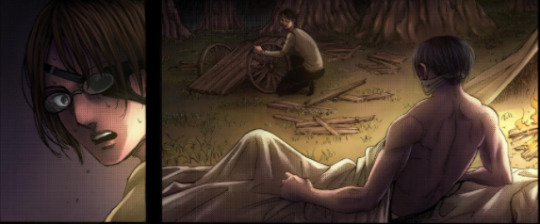
But who pushes him down? Tells him he doesn’t need to stand?

Hange?
And if you look at every other scene after?
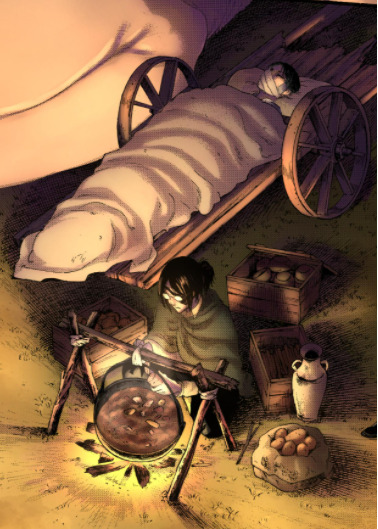

And where does Levi sit up for the first time?

When Hange has to leave him to fight.
So really, my interpretation behind this was just as long as Hange was there to take care of him, Levi wouldn’t sit up, Levi would let himself rest.
I honestly think given Levi’s character it would have been harder for him to rest than to fight. He was only letting himself rest and recover because he trusted Hange that much to take care of him. And he was doing it for her.
Which brings up another thing. As soon as Levi realizes it’s an inevitable to fight, like I’m sure Hange told him about what happened in Odiha and when Yelena told that himself, he saw it as an inevitable.
So he forces himself out of bed.

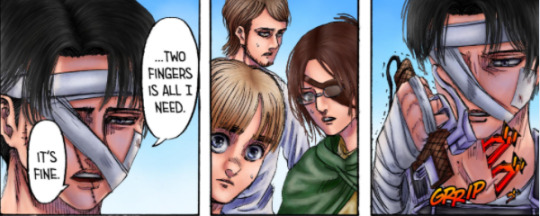
Levi prepared himself to fight long before Hange’s death, long before they found out that Hange was gonna have to sacrifice herself.
I have this headcanon that if Hange didn’t die, Levi wouldn’t have pushed himself much harder because Hange would have been there to stop him and at least she would have been there to carry half the burden.
The thing is Hange, wasn’t there any more? So suddenly, out of nowhere, Levi had to carry the weight of being the last veteran there. And we all know that Levi is motivated by bonds and relationships more than anything and Hange was the bond that ran deepest.
I’ll digress to explain something.
I mentioned above that Levi is always scrambling for something to live for right? And it’s always relationships. Remember Isabel and Farland right? And suddenly he goes for Erwin.
And remember when Erwin died? Erwin is a very important person to Levi, undeniably but this moment, where Erwin died, look at Levi’s reaction.
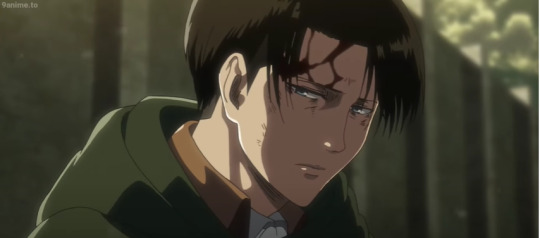
When Hange die... You could literally see the moment where the light left Levi’s eyes.

I’m not here to invalidate Erwin and Levi’s relationship. In fact, I think the loss of Erwin really was a gutpunch to Levi but the presence of Hange made Erwin’s death almost bearable.
Because I really believe that to a degree, Levi took Hange’s presence for granted. Because they got into the survey corps at almost the same time and I’m 99% sure they work closely together because really, why would they ride next to each other during every canon mission even if they’re in different squads and of different ranks if they weren’t.
So Hange was a constant to Levi so Levi’s thought process when Erwin died was: “It’s okay, Hange and I will get through this.”
Because who was next to him when Erwin died? HANGE. And Hange as mentioned above is really one of the biggest constants in Levi’s life.
I’m sure that Levi did not expect her to die, I’m sure he didn’t expect her to leave that fast. I’m pretty sure Levi’s naturally instinct after that, whenever something shitty happened was: “It’s okay Hange and I will get through this.”
Because before that Erwin had so many death flags but I think even the fans weren’t prepared for her death?
And I think similarly, Levi imagined a future with Hange. Like he was sure there was the possibility that she could die but at the same time, I feel like Levi had the natural instinct or just the natural thought process of shoehorning Hange in future interactions he imagined..
And that’s why her death was so fucking painful.
And he lost this constant without any time to think “Okay, yeah so who do I live for now...”
So yes, Levi is ready to fight, he already prepared but we all know he need chapter 133 to mourn.
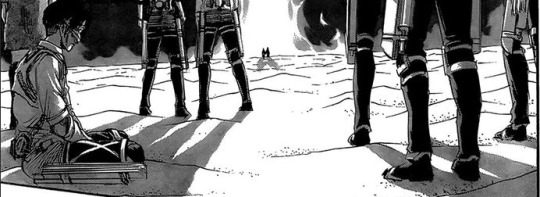
So he just instantly didn’t go ‘woosh’ where’s Zeke.
And there are some serious similarities with the way he handled Isabel and Farland’s death and going straight to serving Erwin from there. The thing is, after Hange’s death, he lost someone incredibly close to him and someone he didn’t expect to die at all. Isabel and Farland’s I feel like Levi almost saw that coming. With Erwin, Levi saw that coming too.
But after this bullshit that came out of nowhere where Hange was like “let me go?”
He mourns of course. But what does he do when he first joins the battle. (As if he were scrambling for another reason to fight.)
He saves Connie and Jean right? Because suddenly he realized that they’re the people he’ll be fighting for next, and he literally throws away all natural self preservation instincts to save them.
And really?? People are focusing on Zeke?? If Levi were so damned focused on killing Zeke, I’m pretty sure he wouldn’t have jumped to save Jean or fucked up his knee to save Connie.
Because he would have wanted to be in tip top form to kill Zeke right?
Anyway, I dunno who’s saying stuff like this but I’m kinda suspecting we’re not following the same show.
223 notes
·
View notes
Text
ok you know what i think it’s actually really vital that i talk a little bit about tea time. buckle up kiddos.
first off, a brief and relatively spoiler-free summary: the premise of the issue is very simple. the kiddos (aged up, if willow’s mention of being engaged is any indication) are hanging out in the library to help giles with research, swapping stories about what it would be like were giles a vampire. each of them, save giles, gets a chance to tell a detailed story -- xander tells two! -- and each story plays out in a way that says a lot about the scooby that’s telling it AND the way they view giles.
obviously this is a VERY character-driven issue, and it’s a really really interesting look at giles and how he is perceived as well! shit like that is my bread and butter, so this has honestly become one of my favorite things that boom has put out -- possibly my ACTUAL top favorite issue if we’re being real here.
below the cut is a spoilery dissection of every story told -- a literal summary of Every Single Thing that happens in this issue, as well as what it has to say about the scoobies and their perception of giles, so definitely keep that in mind.
as can be seen in the preview, xander’s first story is about giles rising from the grave as an ineffectual british caricature, who is easily defeated by smoldering, sexy xander harris (and xander in turn walks off with buffy and willow draped all over him, cooing about how amazing he is). it’s more of an intro to the premise than anything, but it still sets the tone pretty clearly wrt how xander handles this situation: there’s some laughter and levity, and he’s center stage. obviously a lot can be said about xander’s self-esteem issues and how he overcompensates by casting himself as the main protagonist both in canon and here. however, i wanna save my more in-depth xander analysis for his second, longer, story, so i’ll stop myself there.
willow immediately responds with skepticism: she’s of the mind that giles would be an incredibly serious big-bad level threat. the tale she spins involves giles as a dangerous vampire cleric with access to a cryptic altar, killing xander almost immediately and slaughtering buffy as a sacrifice to create eternal night. her view of giles is more clinical than anything -- and, i would argue, the most perceptive and realistic from a threat standpoint. the guy knows a fuckton of magic and he is incredibly well-read and powerful. he’d have some kind of terrifying master plan. where xander goes for comedy, willow goes straight for logistics, already looking at the battle like it’s a battle rather than laughs aplenty.
xander and buffy have a bone to pick with willow’s story (xander is indignant that he’s immediately and brutally killed, buffy is of the mind that she would easily defeat giles in hand-to-hand combat even if he IS a vampire), so (after one more teasing story where buffy lives and xander dies) willow gracefully alters her narrative to reflect her friends’ objections: after a dramatic tussle, xander helps willow and buffy unceremoniously stakes giles in the heart. still pretty straightforward and plausible. willow sees vamp giles primarily as a threat -- one not easily neutralized. one who could easily wipe them out.
buffy, about to tell her story, is interrupted by xander, who “had an even better idea!” the web he weaves is this time purported as realistic and entertaining: while partying at the bronze, buffy and co. are interrupted by a bunch of balding, greying vampires in curlers and bathrobes, led, of course, by giles -- who is wearing a hair bonnet and disapprovingly informing the bouncers how late it is at eight PM. a knockdown brawl breaks out at the bronze -- old people feeding on and decimating the young -- and culminates in giles and the geezers taking over the band to sing “some terrible song” that’s “probably something really old and bad!” the rest of the story descends into b-movie chaos, with buffy throwing a broken guitar neck up at the stage lights to send the whole thing crashing down onto vampire giles and his vampire old person band. it’s categorically absurd.
the thing that really sticks with me about this story is how dumb it is. xander’s take on giles is not even slightly serious and wholly underestimates him. fandom at large talks a lot about how giles dropped the ball with xander, but i think tea time explores an easily overlooked factor: xander constantly, consistently underestimates giles. in canon, xander’s view of giles is not often challenged: to him, giles is a bumbling, british librarian who regularly gets his ass handed to him by vamps and demons and the like. certainly part of his story’s intent is about laughingly entertaining his gal pals, but there’s a very real and consistent thread involving giles being hilariously nonthreatening.
giles, taking umbrage at this particular tale, calls out both xander and willow: xander’s story, in giles’s opinion, emasculates vamp giles and turns him into a ridiculous caricature -- and willow’s story, though much more flattering, lacks the kind of imagination that vamp giles would clearly have. he then offers a suggestion of his own. it’s worth mentioning here that both xander’s and willow’s stories get gorgeous multiple-page spreads depicting the vampy action, but giles’s is a simple and chilling little thing: this is his vampire story. this meeting, called to ostensibly “research” a vampire altar, is really an excuse to get the scoobies to do his dirty work and find the thing for him. they’re tired and silly because the tea and donuts he’s given them are drugged, and their library location is to keep them out of daylight. he laughs it off when he sees they’re bothered, and the meeting is then adjourned when willow finally finds what they’re all looking for.
buffy’s left her phone in the library, so she doubles back, and accidentally wakes up a dozing giles. just as she’s about to leave, he inquires, casually, “...you never did tell your version of the story.”
and good god here is where it gets interesting.
see, buffy’s take is simple: she’s fighting giles in a cemetery, she’s given the chance to kill him, and she is entirely unable to do it. they share a tearful embrace as she sobs about the unfairness of it all -- “you’re giles! and you’ll always be! ...how will i do this without you? without your guidance?” and as the sun is rising, giles turns her into a vampire, with no resistance whatsoever from buffy. the next handful of pages depict bloody, indulgent violence on the parts of giles and buffy, the two of them cuddled up together as they watch the world burn.
buffy’s tale is the most emotive, the most loving, which makes me so damn soft! i love this girl so much! she is unable to even joke about giles as a foe to be taken down -- he is her watcher. he is her friend. she loves him endlessly and that does not change when he’s a vampire. vamp giles as she portrays him is gentle and understanding, holding her as she cries, because he knows that they’re connected. it’s easily my favorite part of this whole issue.
notably, there is a definite buffy/giles bend that the comic itself tries to contradict. the art is sensual in nature -- vamp buffy all dolled up in a way somewhat evocative of drusilla, giles tenderly caressing her face as he waits for her to wake up. “watcher and slayer connected forever” being the quote chosen to describe the situation. i think it’s kind of what naturally happens in a vamp giles sitch, especially if he turns buffy -- the childe/sire bond is incredibly sexual in nature, especially in canon, and a lot of frustrating human sentiment gets translated into something sexual as well. sex is a big BIG part of the relationships between vampires we see in canon; it would make a lot of sense for that to hold true for buffy and giles.
the comic is reticent about Going There, which i can understand -- though buffy is decisively aged up in this issue (willow mentions being engaged to a woman, later revealed to be tara), the buffy/giles bond is always seen through a father/daughter lens in canon. i do think it’s also important to always recognize how desperately giles wishes to escape the label of father in reference to buffy, pretty much entirely because there is no way to parent a child soldier who you’re also training, but that’s a whole other kettle of fish. point is, buffy very pointedly refers to vamp giles as her father not once, but twice -- once as a human, once as a vampire herself. it’s a very clear attempt, imo, to un-sexualize the vampy experience. the reason it doesn’t totally work, at least for me, is the fact that -- like i said -- the childe/sire bond is VERY sexual (spike and dru, angel and darla, angel and dru) and it seems just totally implausible that vamp buffy/vamp giles (two people who, as human were both VERY repressed) would chastely remain within the socially acceptable version of their relationship.
i can definitely understand why they did their best to blur that line, though. the idea of buffy and giles being romantically involved as vampires is 1) Kind Of A Lot and 2) not exactly the target demographic that i think this comic is going for. but the subtext is there, to the point where the issue itself has to actively obfuscate it, which i think is .... so interesting? especially as a counterpoint to the way i often see buffy/giles in fandom, wherein the father/daughter subtext in canon is at times actively obfuscated in fic in an attempt to push a preferred reading.
the ending i particularly enjoyed: after buffy leaves, it is lightly and ambiguously implied that giles might really be a vampire. works GREAT as a standalone, imo, and the end is like the cherry on top. it’s a really REALLY interesting issue and i highly recommend it for any giles fan.
#meta#btvs comics#buffy and giles#''a little bit'' they say. and write a full fucking essay#anyway i love this issue it's my prized possession i am dying for at least one (1) person to read this insane summary and talk to me abt it
77 notes
·
View notes
Text
Damen and Laurent are, in narrative terms, heroines
HEAR ME OUT
Despite the fact that Damen is clearly 100% action hero straight from the lines of an ancient Greek epic, he does not go on a hero’s journey, and neither does Laurent. The Captive Prince series follows the heroine’s journey instead and now that I’ve seen it, I can’t unsee it and now you all need to know about it.
They subvert the hero’s journey at every turn:
- They don’t ever turn against the call of adventure; they gather the best allies they can and head towards it.
- There is no grizzled old mentor for them; they have to find their strength in each other. Old men will either hit on you or get you drunk.
- They never abandon their community; Damen is ripped screaming from his and spends the trilogy fighting to regain his place in it, and Laurent does something similar on a different timeframe and in a nastier more head-fucky way.
- They do not win their final battle on their own, one-on-one; they win it together, using the allies and information they’ve gathered.
- There is no glorious-but-isolated ending for either of them; instead they not only take their places as leaders in their communities, but unite their kingdoms, in a move that should make each stronger and more peaceful. There is specific mention of them building a new empire together.
They both absolutely follow a heroine’s journey instead (much like Harry Potter or Dorothy in the 1938 Wizard of Oz film):
- Damen and Laurent both had their family taken from them, and find the love and closeness that they lost in each other.
- Like every good heroine, they achieve their goals by sharing information, by requesting help from others, and delegating, knowing what their own weaknesses are and seeking out other people who can make up for them (including each other). Being an action hero, Damen isn’t necessarily good at this at the start but he gets better at it all as the series progresses and he realises that the way he thought his life and reign were going to play out (a repeat of his father’s) isn’t going to work and even comes to understand that this is a good thing.
- They each sacrifice themselves for the other.
- They have a happy ending, surrounded by allies they can call on, providing safety and security.
AND SPECIFICALLY
There are also a lot of parallels in CP to one of the oldest examples of the heroine’s journey, the Rape of Persephone. The bit I’m most struck with right now is the middle bit everyone always forgets about, where Demeter gets really down and gives up for a bit on her quest to find her daughter, and instead of going home, settles down with a King and Queen who take her in, and becomes nurse to their son, Prince Demophon. She tries to make him immortal, to make him her son, except she’s stopped. When I thought about it, this whole bit reminded me so strongly of the bit where Damen is staying in Karthas and thinks Jokaste’s baby is his son and feels stuck, and he goes to Laurent, “We hold the middle; what if we just stay here? Call it a kingdom?”
I’ve seen several people (mostly on the Discord server) complain that the baby plot is the weakest part of Kings Rising; but what if Pacat was specifically trying to replicate this part of Demeter’s journey? The fact that Jokaste’s ploy in that part of the plot (saying her son is Damen’s) affects Damen so much is more evidence that he’s on a heroine’s journey, not a hero’s. Jokaste is not the female archetype that you might see in the hero’s journey here, seducing the hero into inertia like a Circe; it’s the baby Damen wants here, not her (he couldn’t want her less) and then he goes off to try and get him.
He then gets into trouble because he does what a heroine shouldn’t do; he ignores Laurent when he tries to warn him that it’s all a trap. It’s the same thing that gets him into trouble again and again - acting on his own and not listening to people. The main times Damen gets into trouble it’s because he’s acting like a hero and not a heroine -- he doesn’t listen to Nikandros’s warnings about Kastor, and look where that got him. He runs off when he gets his chance to escape the palace at the end of the first book, instead of listening to Laurent saying it’s not the right time to try it.
HEROINE’S JOURNEY BITCHES
323 notes
·
View notes
Text
Okay, onto chapter 128 of SnK. There’s some really huge thematic payoff in this chapter which I want to talk a little about!
The big theme that really comes full circle here is the theme of violence, and how it’s intrinsically linked to the human condition. That’s obviously a huge theme throughout this entire series, but in a lot of ways it culminates in this chapter.
I first really noticed it in a big way, in terms of having a big impact on the characters, way back in chapter 50 something, during the Uprising arc, in that scene where Jean, Connie, Sasha, Mikasa and Armin are waiting around, and they start talking about Levi and how repulsed they feel by what they perceive to be his unnecessary violence. They flatly condemn him for it, even going so far as to say there’s something wrong with him, and making bold statements about how they would never kill another person, no matter the circumstances. This statement of course comes back to bite them not long after, when Armin is forced to kill one of Kenny’s squad in order to save Jean, and Jean begins to understand the impossibility and even selfishness that can be inherent to holding without compromise to one’s moral values.
That theme comes back in a huge way in chapter 128, and it’s really interesting to see Reiner try to step in and take on the role of martyr by telling the members of the 104th that they don’t need to fight, trying to save them from the moral dilemma of killing their own comrades. What I found really interesting here was how Jean, Connie, Mikasa and Armin don’t answer at first, and you can see this is a huge struggle for them, the scenario presented before them one which clearly goes against everything they want to believe they’re fighting for. Connie even says that they’re supposed to be saving people, not murdering their friends, etc... But it’s impossible to ignore how it’s Hange who steps in and dashes any possibility of them sitting this fight out against the rocks. They say they aren’t interested in being a spectator, and reminds everyone there that humanity doesn’t have any time left for them to be debating their morality. This ties back in perfectly with what Levi had spoken to his squad about way back in the Uprising Arc, again, when he told them he doesn’t know what’s right or wrong, and that all any of them can do in any given situation is act in the way they think is best, both for themselves and those they care for, and for humanity as a whole. We’ve seen Hange come to terms with this blunt and often brutal reality well before this, during the battle for Shingashina, for example. Hange really began to separate whatever moral qualms they might have had, any emotion they might have had about killing other people, during this arc, and coming to really understand and accept that sometimes morality was something that had to be sacrificed for the greater good. Here in chapter 128, Hange isn’t interested in or willing to indulge in preserving either their, or anyone else’ moral purity at the expense of the Marlyean group. They’re in this together, and Hange understands fully that to accept Reiner’s offer of sitting back and watching while he, Annie and Pieck take on the Yeagerists would be the height of selfishness and a prime example of placing one’s own moral purity over the well being of others. I always think it’s brilliant the way AoT explores these issues, of how an uncompromising loyalty to one’s idea of morality can, in fact, lead to total disaster for others, can in fact worsen the lives of others. How if one has a moral code they are absolutely, under no circumstances, willing to break, that person often is the one who is most self-serving and self-centered, more concerned with keeping their own hands clean than with helping anyone else. SnK doesn’t condemn violence, but instead makes very strong arguments for why it is sometimes not only an option, but the ONLY option, and that’s incredibly bold, and incredibly true to reality.
Armin, as usual, is the first to understand this, after Hange reminds them all. Armin was also the first, back during the Uprising Arc, to extend understanding towards Levi and his violence, and why he had to at times resort to it. Armin flat out says here “I refuse to stand by with clean hands”. He’s acknowledging the selfishness inherent in an uncompromising moral code, and refuses to place himself above the rest of humanity, even if it means once more getting his hands dirty with the blood of other people. He still comes up with a plan to try and avoid any bloodshed, but you can see Armin is willing and ready in this moment to do whatever is necessary, which he does when he and Connie get into the situation they do with Daz and Samuel. Armin is the one who tackles Samuel, which is what gives Connie the chance to shoot him.
There’s this huge moment with Levi I want to talk about, after everything goes to shit and Armin’s plan falls apart, where Yelena says “You can’t separate humanity from violence.” And then she says to Levi “Right, Captain?”, and we get a look at Levi’s face, and once again, he just looks filled with naked despair. I think these two panels are incredibly important in understanding Levi’s own psychology during this entire final arc. Yelena is right, for once, when she says you can’t separate humanity from violence. It’s a part of the human condition. And she asks Levi specifically about it, because if anyone understands this, it’s Levi, who grew up in a world where violence was often the ONLY option, if one wanted to survive, or protect those they cared for. But Levi’s saddened expression in the following panel really speaks to his feelings regarding the undeniable truth of Yelena’s words. Levi knows it’s true, but he wishes desperately that it wasn’t. I’ve called Levi an idealist over and over, and it’s because Levi is someone who understands the way of the world, and understands human nature, with more clarity and compassion than probably any other character in the series, he understands that violence, pain, poverty, desperation, fear, death, are all a part of life, and especially a part of the human condition, and yet, even with that understanding and acceptance, Levi is also someone who strives towards something better, towards a world in which these things AREN’T necessary, aren’t inevitable. Levi has been fighting this whole time in order to try and create a world in which people can live in genuine peace and prosperity, without fear, or violence or inequality. But every bit of Levi’s life experience tells him and reminds him, day in and day out, of the impossibility of that ideal. The impossibility of creating a world in which these things don’t exist. Nothing in Levi’s life would ever lead him to believe true peace and prosperity for all is an attainable dream, nothing in his life which would ever give him real hope in that dream becoming reality. But still, he fights for it. This is part of what makes Levi so remarkable. It’s the very fact that he STRUGGLES to believe in the possibility of a better world, and yet still gives everything of himself to make it a reality, that makes Levi such a hero. In fact, Levi doesn’t really believe that it’s possible, I don’t think, his life having been too hard and too desperate to fully embrace such an ideal notion. But, once again, even as he’s riddled with doubt as to it’s attainability, he sacrifices everything he has for the possibility, no matter how slim. Levi’s naked despair in the panel following Yelena’s question is because he’s being reminded once again of the impossibility of that dream. Once again, he’s being shown that humanity is incapable of achieving true peace within itself, he’s being shown once again that people are by nature violent and warlike, and that everything he’s fought for seems more and more like a distant and hopeless dream. Yelena sits in stark contrast to Levi here. She’s bitterly accepting of the ugly reality, unmoved and unemotional. She doesn’t care. She thinks humanity is a worthless mess, unsalvageable and unworthy of salvation. To Yelena, this is the inevitable result of humanity’s very existence, and to fight for something that unrealistically idealistic is a fools errand. Indeed, Yelena seems almost to revel in it, the violence serving as affirmation of her beliefs, giving her a sense of validation. But Levi, beside her, is deeply affected, his pain and sadness openly expressed in his face, his disappointment and heartbreak plain to see. Levi is HURT by the violence, by seeing it unfold. Levi, despite knowing the truth of Yelena’s words, despite knowing from the most first-hand experience the brutal and violent nature of human beings, and the improbability of humanity ever achieving true peace, still believes with his whole heart that humanity is WORTH fighting for. Levi, despite how hard it is for him to believe in actually achieving a better world, still believes that FIGHT is worth an attempt. And that’s really one of the most vital philosophical difference between Levi and people like Yelena, or Zeke. Despite knowing and understanding better than anyone the brutal and harsh reality of the world and humanity, to Levi, it’s still something that’s worth fighting to protect, and worth sacrificing for. Even against his own, weary doubts as to its possibility. And that just shows a strength of character that is immense. To be so burdened by doubt, but still to fight with every last ounce of your strength, to give to your very last breath. That’s Levi. That strength of character, that unwavering conviction in giving his all to a cause he isn’t at all sure is even possible, is never more apparent than in this final arc, when Levi is in the most literal sense at deaths door, physically wrecked and barely able to even stand, and yet still he fights with everything he has. That truly is remarkable. That truly is heroic.
Just one more note. Floch really exposes himself in this chapter for what he actually is, which is a power freak. He’s been spouting off this whole time about the Empire of Eldia and saving the island and the people on the island and blah, blah, blah, but during his conversation with Kiyomi, he admits that he doesn’t really believe that the island will be safe, even if Eren wipes out all of humanity, that people will still continue to kill each other, and then he starts in about how what’s important now is for people to “know their place”, as he holds a gun to Kiyomi’s head. Floch is a power freak, he wants to control other people, wants to dictate to them, wants to hold power over them. He exposes that about himself here. He doesn’t actually care about Paradis, or the people on it. He’s simply getting off on being able to push other people around and make them do what he tells them to. He’s such a bitch. It was hilarious when Kiyomi took his ass down and messed his arm up.
24 notes
·
View notes
Note
Hey Clyde, did you check out Wonder Egg Priority at all? The first ep is super promising, but the series as a whole is one of those real fascinating disasters from a story and a production standpoint that might be up your alley as a thing to pick apart haha.
I’d warn that it’s also reeeeal offensive and this generally gets worse as it goes though.
Hi, Phoenix! How are you and Cube doing?
Okay, I hadn't watched Wonder Egg Priority when I received your ask this morning. Now I have. In a fit of intense curiosity I settled down for a rare binge session and tore through all twelve episodes + OVA in a single sitting. It is now nearly 3:00am as I write this because I, oh so clearly, make fantastic life choices.
A question for you: what did I just watch?
The rest is going under a read more partly for spoilers, but more-so because WEP—and the summary I'm about to give, because I feel like I need to try and explain this to tumblr's faceless void for my own, dwindling sanity—comes with about every trigger warning under the sun. Seriously, if you are triggered by anything that we might think of as a "standard" trigger (meaning, not unique to you and your own experiences), best to proceed with caution.
Right! What the ever loving fuck happened in this show? Well, let's work through this chronologically. Two genius, frat boy brothers (I get their names mixed up so I'm not even gonna bother) are locked in their apartment and closely monitored because of Super Secret Science Research. Even though, I think, they're the ones who created this company. Not important! What is important is that they're bored enough to create an AI for funsies, thinking of her as their daughter and letting her name herself Frill. Frill is the perfect, cutesy, also genius child who has a habit of popping her lips — which the camera focuses on in an incredibly creepy fashion. One day Brother #1 (the hot one) falls in love with a random woman we know nothing about and Frill gets jealous.
"Jealous in a general sense?" you ask, thinking this show is in any way normal. "Like, just of her Dad giving attention to someone else?"
"No," I respond, patting your hand. "Jealous because she's in love with him." Which, beyond the subject matter itself, comes completely out of nowhere. Frill has a line about what you'd do if some woman stole your husband away. I, fool that I was, briefly considered that these two guys were lovers, not brothers. Oh no. They're brothers. Frill just considers Dad #1 to be her "husband."
So, in true evil AI fashion, she murders the wife, leaving only her newly born child behind. Who is a daughter.
Uh oh.
Dad #1 locks Frill in a coffin-esque hole in the basement and goes on with his life. Things are great! Until years later when the daughter reveals that she has fallen in love with her uncle (Dad #2 to Frill). She knows (somehow??) that both her dad and her uncle loved her mom, so if the loser uncle will just wait a few years he can marry her instead! He brushes her off, but the next day she’s found dead of an apparent suicide.
Realizing that this was somehow Frill’s doing, he marches down to the basement and confronts the murderous child they’ve had locked up for years. She’s now surrounded by screens in, again, true creep AI fashion. How did she get all this while she was locked up? Oh, just the three bug girls she created as friends prior to killing the wife. They’re devoted slaves, I guess. So the uncle says enough of this insanity and seemingly sets Frill on fire.
OH and Frill’s subtitled dialogue also puts “uncle” in quotation marks, implying that the daughter was always Dad #2’s??
Anyway, both brothers are now super obsessed with death and claim that they think Frill has had a hand in lots of girls’ suicides, even now after her own death. This is brought into question later when it’s revealed that they might have just concocted this scheme to try and bring back their daughter. I’m really not sure. Regardless, they use hand-wavey science to create eggs that I guess contain the souls of young girls who have committed suicide, then they sucker in other young girls who have lost people to suicide to try and rescue their loved ones in a dream world, saving others along the way. A tomboyish girl, Momoe, lost a classmate who admitted to loving her, but who Momoe rejected. Rika, a former junior idol, used and rejected an overweight fan only to learn later that she’d starved herself to death. Neiru, the 14yo president of some science company (yup) was attacked by her sister before she jumped off a bridge. Finally Ai, our protagonist, is a victim of bullying who managed to make friends with a single girl, Koito, who then jumped from their school building for unknown reasons. They’re all given the chance to bring these individuals back to life, provided they protect other victims of suicide by defeating the monstrous traumas that drove them to that act in the first place.
And you know what? That concept was great. However, the execution ranges from “Okay, that was pretty good for an anime. Kudos there” to “That’s the most offensive thing I’ve seen in my life.” Needless to say, unpacking all the battles they fight would take a lot more than this already absurd summary. Basically, if you can think of something horrible to happen to young girls (and one trans guy whose existence in that egg undermines the whole message of the episode), there’s an attempt to tackle it here.
During all this the four girls become friends and Ai works through her suspicions about Mr. Sawaki, a teacher at her school. What’s going on with Mr. Sawaki? Uh… everything! He’s somehow connected to Koito’s death, he’s dating Ai’s mom, and Ai apparently loves him too because her friends say so, even though this is never actually addressed and she barely interacts with him. It’s all quite the complication.
In time though the girls complete their “mission” of bringing their loved ones back to life. Rika and Momoe manage it first, only to find that Frill’s bug-girl lackeys have arrived to kill them. Why? Because that’s what Frill does, I guess. Momoe’s crocodile familiar (cute animals the girls were gifted to help them fight) takes a killing blow for her and the bug-lady then proceeds to carve up his corpse and force feed it to Momoe. Fantastic!! Building off of that, the next bug-lady who Rika encounters kills her turtle too, following in the footsteps of her bug-sister by, presumably, forcing her to eat parts of its head. Ai refuses to sacrifice her familiar to stay alive, but luckily the suicide she was protecting turns out to be herself from a parallel universe (that's a thing now!) and she takes the killing blow herself, which is done by pulling out the eye she’s sensitive about (she has heterochromia.) So parallel Ai passes on (again?) and the three girls don’t work through this trauma at all, instead becoming more traumatized through the realization that the loved ones they brought back no longer remember them. They’re alive, but the relationship they all had with them is dead.
It’s about this point that the main storyline wraps up and I’m relieved that there’s an OVA to finish things off. Surely they can somehow bring this all together in 45 minutes.
…25 minutes of that OVA is recap.
So with only about 20 minutes left, we learn that Neiru, the only one to not complete her mission yet, has mysteriously gone missing. It turns out she was an AI/clone/something all along, made to replace her sister and, presumably, that’s what caused the whole stabbing-suicide incident. She successfully brings her sister back, but stays behind in the dream world because Frill promises her she can become human. How is Frill here when she’s dead? How will Neiru become human? Isn’t Frill the “temptation of death” or whatever? There are no answers. A flashback finally reveals that Koito was having a relationship with a teacher at another school, he committed suicide, she transferred, she tried the same thing with Mr. Sawaki, he kept refusing her advances, and finally while threatening suicide to get his attention, she accidentally fell.
(So why was she in the suicide egg if it was an accident??)
Except, all this information comes through Mr. Sawaki himself, there’s a whole subplot about whether he’s really a villain, or if Ai is just making him into one, and this show might as well be titled How Much Pedophilia Can We Put into One Anime? So make of that what you will.
A dead character randomly shows up, but it's fine because she's actually just a version from a parallel world. How did she get here? Why is she here? Lol, it's cute that you think these are answered.
Rika, the character who cuts and almost committed suicide halfway through the show, breaks down saying how much she misses her dead loved ones, right after her friends refused to let her go on another mission that would surely end in her death and… that’s it. That’s all we get about her.
Momoe too, though she’s hopefully just vibing somewhere with that longed-for boyfriend.
Ai transfers schools and then one day randomly remembers that she loves Neiru and rushes back to start cracking eggs again because that will? Somehow?? Let her see Neiru???
When I say there are too many unanswered questions to possibly list here I really, really mean it.
Finally, in a personal attack on me, the protagonist with a name that is literally AI is not in any way an artificial intelligence.
And that’s it! Congratulations, you now “understand” WEP. And see, the funny thing is that the off-the-rails, bat-shit crazy aspects kind of catch you off guard? Yeah, the first episode is fantastic. In fact, I think I got through about six episodes thinking that this was a solid, if at times really messed up anime, but I was willing to shrug off a lot of stuff due solely to the amount of sensitive material they were attempting to cover (which is always quite difficult to do). Probably the only reason I was able to binge so fast was because the first half of the series was so engaging. The characters are charming. The animation is GORGEOUS. There's actually a ton of good here that is also worth yelling about. But then the plot comes in like a freight train and I was left staring dumbfounded at my screen as more and more insanity kept happening. Having watched the "explanations" I am now more confused about the show I just saw.
Phoenix, if you’ve bothered to read this rambling, 3:00am rant: thank you. I think? Idk if I should actually be thanking you or cursing you for tuning me into this, but it was definitely an experience, that’s for sure lol.
I'm off to bed now RIP the chance of having normal dreams ✌️
40 notes
·
View notes
Text
Octavia as The 100′s Jesus Figure, Part 4: Bardo, The Crucifixion and Second Coming of Octavia Blake
So we’re back for a fourth part of this series, which I started after season 6, because wouldn’t you know it - there’s more to be said.
In Part 1, Origin Story and the Meeting of Two Saviours, I discussed Octavia’s origin story as the Dark Saviour and her relationship with the show’s other Saviour Lincoln, and how with his death he invested her with the mission to save all of their people.
In Part 2, Saving Humanity and the First Passion of Octavia Blake, I talked about Octavia finally accepting and understanding her mission as the Saviour, redeeming the sins of humanity, and her first Passion narrative, which was left incomplete, and thus she lived.
In Part 3, Planet Alpha and the Second Passion of Octavia Blake, I wrote about Octavia’s second Passion narrative on Planet Alpha, which led to her road to Golgotha at the Anomaly, from which she is resurrected (the Crucifixion narrative still remaining a mystery) and then meets those she knew once again, before her ascension as the Anomaly reclaimed her in the last seconds of the S6 finale.
So now, Part 4 - Here we will get into that missing Crucifixion narrative, as well as the events that come to pass with Octavia’s Second Coming, the Judgment of Humanity, and how things may have played out differently had it been Octavia who walked into the glowy ball of light instead of Cadogan, Clarke and Raven.
From Dark to Light
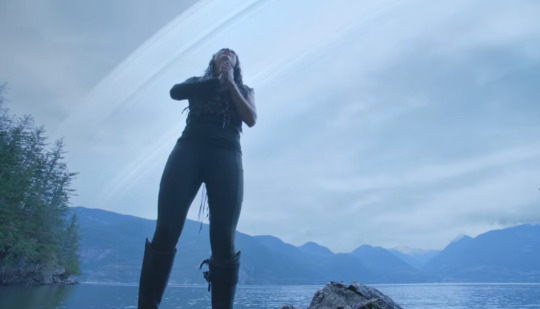
Before we return to that missing Crucifixion narrative, which takes place on Bardo, Octavia, along with Diyoza and Hope, land on a different planet for ten years. This planet also has its purpose in our Saviour narrative, because while the show starts on dark themes, and thus needed Octavia as a Dark Saviour, in season 7 it began to shift to a theme of light and transcendence.
Enter the appropriately named Penance.
Octavia spends ten years on Skyring/Penance/Planet Beta, healing from her pain and darkness, and thus is no longer the Dark Saviour the narrative needed her to be before to bring salvation to her people, now she can be the Light Saviour who will save all of humanity.
Her new demeanour - though I hesitate to say new because it was born of ten years of peace, plenty, family, and healing, it wasn’t new to her, merely to those who used to know her for whom time had been much shorter - is evidence of her new Light. It confuses many, because they hadn’t had the same time and healing as she had, but it is evident in every move she makes. Rather than the tornado of righteous fury that she used to be, now Octavia is the steady and calm voice of reason - to Echo, to Hope, and especially to Clarke.
But back to that crucifixion narrative.
Every Noble Crown will be a Crown of Thorns

Her peaceful world torn asunder, Octavia is taken to Bardo, and thrown into M-Cap at the first opportunity. Others have mentioned how the M-Cap headcap looks like a crown of thorns, and they’re quite right - this is where Octavia’s Crucifixion narrative comes to fruition. No one spends as much time in that crown of thorns as she does.
She fights it, at first, but when acceptance is what will provide salvation to her people (or person, in this case, being Hope), she accepts her fate and faces her past - brutal days of reliving her history as the Dark Saviour, to firmly close that chapter of her life (a symbolic death rather than just her regular baptism-rebirth cycle).
She’s freed from her crown of thorns when Hope comes. Hope, the symbol of her new Light, and the Light that she will carry with her as she returns to Sanctum to be resurrected among those she once knew, those who had believed her to be lost, but who dearly needed the Light she was to bring them.
Revelation and The Second Coming
There are a lot of different moving pieces involved in the apocalyptic scenarios of Revelation, and how these come to play in season 7 of The 100 isn’t any different. So let’s take a look at some of the other key players and how they connect to Octavia’s story.
The False Prophet, The Dragon and The Beast

Now, in my Part 3 of this series (written after the S6 finale), I predicted that Bellamy would have a large part in the revelation of Octavia’s Saviour narrative. Obviously, that part didn’t come to pass, because of Bob’s absence from the show, but you can still see hints within the narrative that suggest he would have been a part of it before Bob pulled out (most notably, the Hesperides flashback in 7x04 - this flashback is pretty pointless in the context of Hope telling Echo and Gabriel that story, but if you imagine Bellamy being there to hear about how his sister raised Hope in much the same way he raised her - then it becomes way more meaningful).
But the narrative as it played out also presents interesting Biblical allusions, by casting Bellamy in the role of false prophet, fighting on the side of the Beast (Cadogan), instead of on the side of Christ (his sister).
The false prophet is said to be the second beast to rise in Revelation 13, who has “two horns like a lamb, but it spoke like a dragon” (Revelation 13:11) who is given the authority to speak on behalf of the first Beast (Cadogan), to deceive the people so that they will worship this Beast. The false prophet having the appearance of a lamb is relevant here, because Jesus is often referred to as the Lamb of God - thus, the false prophet (Bellamy) resembles the true Saviour (Octavia), not coincidental since they are in fact siblings and thus do bear some physical resemblances.
So who is The Dragon - that is, Satan? It is easy to say that the Dragon is Sheidheda, for it is the Dragon who is imprisoned, only to be released to deceive and wage war before being finally defeated. But it goes deeper than that - The Dragon is the dark side of the Flame itself, Sheidheda’s only the last prophet of that darkness. It is the Flame that gives Cadogan, the Beast, the power he needs to rule over his people - the glimpse of the idea of Judgment Day as something for the Disciples to work towards - “The dragon gave the beast his power and his throne and great authority” (Revelation 13:2) - even when the good side of the Flame, the Humanity that Becca believed so vital, wanted to keep it from him.
The Children of the Kingdom of Heaven

Jesus says “unless you change and become like little children, you will never enter the kingdom of heaven” (Matthew 18:3). Octavia’s always been tied to different children throughout The 100 narrative, first as the child herself, and then others such as Gavriel, Ethan, Madi, Rose and Hope. But the important children for the purpose of this post are the three that are the “next generation” so to speak of the leading trio of the show, and their important roles in the final battle.
There’s Jordan, the Head-centered, who takes over Clarke’s role as John the Baptist, the prophet who bore witness to the Light (Jesus) so that others would believe. His testimony shows that the Final War is instead a Test, and he’s instrumental in making sure that Octavia can stop the war and pass the test to grant humanity eternal life instead.
There’s Hope, the Heart-centered, who takes over Bellamy’s role as Saint Peter, the disciple who becomes the leader of the church after Jesus’ ascension. Hope is Octavia’s grounding force, her new rock, and her love gives her strength to continue her journey.
And then there’s Madi, the Soul-centered, who is Octavia’s next generation counterpart. It’s made clear from the start of Madi’s introduction in season 5 that Octavia is her favourite, that Octavia is the one she looked up to, and even in season 7, these parallels are there, as Madi is ready to sacrifice herself to save the others, and in more peaceful ways too, like when she’s hiding in the reactor with her two new friends, reminiscent of season 1 Octavia and her friendship with Monty and Jasper. Madi, too, meets her Crucifixion in the M-Cap chair, in an even crueler and more vicious manner than Octavia did. But when Octavia saves humanity, this liberates Madi’s soul and grants her eternal life as well.
I am the Way, The Truth and the Life
Wonkru falls apart in Octavia’s absence. There’s no other way to say it. Wonkru crumbling in 7x03 is made even more conspicuous by the fact that they don’t even mention Octavia, because they’re still denying her, despite everything she brought them. They don’t realize that she’s the one to save them all, they don’t realize that, as Jesus says, “I am the Way, the Truth and the Life, no one comes to the Father except through me.” (John 4:16) - something that they will finally come to understand in the climax of the final episode.
But it isn’t time for that story yet. First we must turn to Revelation to see what happens to Wonkru and the others on Sanctum while they’ve chosen to deny her and follow the Dragon and the Beast instead.
Here we see the different plagues that strike the unbelievers - both in Revelation 8-9 and 16.

The first to come are “ugly, festering sores [that] broke out on the people who had the mark of the beast” (Revelation 16:2) - the radiation sickness that is a marker of the broken nuclear reactor in 7x03, which claims as James as one of its first victims. If you don’t remember who he was while watching that episode, look back to 6x02, where he’s one of the people attacking Octavia in the Eligius IV mess hall. He breaks faith with her, and here suffers the consequences of that.
The second and third plagues speak of both the seas and the rivers turning to blood - references to the rivers of blood created by Sheidheda’s massacres, first of the Faithful and then of the Children of Gabriel.
The fourth plague, the sun scorching people with fire, takes us to the eclipse in 7x13, where the sky is red with the eclipse. This leads to the fifth and sixth plagues - the kingdom being plunged into darkness as Emori kills power to the reactor to bring down the shield, which makes it possible for “locusts [to come] down on the earth” (Revelation 9:3) and devour those “who did not have the seal of God on their foreheads” (Revelation 9:5).

It is only the final plague - “rumblings… and a severe earthquake… [where] the great city split into three parts” (Revelation 16:18-19) - that strikes where Octavia is, with “a loud voice from the throne, saying ‘It is done!’” (Revelation 16:17). This line from Revelation calls back to what Octavia says to Hope in 6x13 before her Ascension - “Be brave, tell him it is done” - a sign that Octavia is needed elsewhere again. And soon enough she does depart to Bardo, alongside Clarke. Meanwhile, the survivors remaining on Earth have to reunite the three groups split in the bunker - those in the rotunda (Hope, Jordan, Gaia, Indra, Miller), those in the rec room (Raven, Murphy, Emori, Jackson) and those in the bunkrooms (Echo, Niylah) - to prepare for the final war and judgment.
The Fall of Babylon
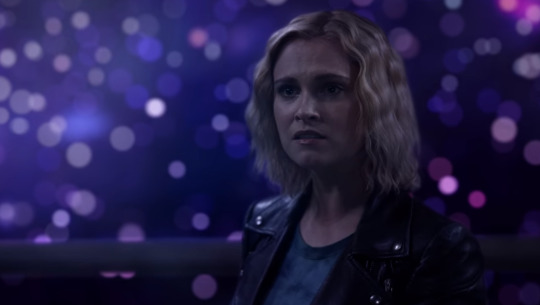
Before Octavia can bring light to the world and grant humanity transcendence, there is still one more key part of Revelation that must come to pass, and that is the fall of Babylon: That is, in this ‘verse, Clarke.
Throughout Biblical narrative, Babylon stands in opposition to Jerusalem and its righteousness, just how in The 100 narrative Clarke and Octavia have always been set as foils to each other. Now, Clarke isn’t evil per se, but she’s always been set in her ways and doubles down when questioned about her past deeds - as we see both in how she faces the Primes in 6x03 and the Judge in 7x16. She doesn’t learn, and so she fails. Clarke, like Babylon, is locked out of heaven for not learning the patience and humility that Octavia did: “For her sins are piled up to Heaven, and God has remembered her sins. Give back to her as she has given, pay her back double for what she has done.” (Revelation 18:5-6).
With Clarke fallen, it is now time to begin the Final Judgment.
Final Test and Judgment

After Clarke’s fall, someone must step in to advocate for humanity, to guide the Judge’s gaze to the righteous, to the Saviour - Raven steps through the glowing orb to do so. So which figure in Revelation is most suited here? None other than the writer of Revelation themselves, historically considered to be John of Patmos, who is given these visions by the angels as a warning for humanity.
Raven bore witness to a number of the plagues, and while not always a believer in Octavia - in fact, out of all characters around for all seven seasons, they’ve shared the least screentime with each other - but they’ve still fought on the same side. Also of relevance here is that Raven’s been granted visions in the narrative of the show, like John of Patmos has in Revelation - though hers came as a result of ALIE.
While the Judge takes Raven to the battlefield in Bardo to prove humanity to be unworthy, this battlefield is instead where Octavia proves humanity to be worthy. Indra and Wonkru follow Octavia’s lead, finally recognizing that their only way to salvation was through her (see John 4:16 above), and after the Disciples too laid down their weapons, humanity is deemed worthy and the Judge grants them eternal life in the form of transcendence - rising to the heavens in the manner of the Rapture, “We who are still alive and are left will be caught up together with them in the clouds to meet the Lord in the air” (1 Thessalonians 4:17).
Where is the Judgment of the Dead?
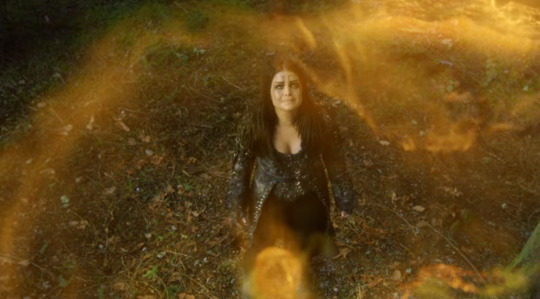
Now, one thing missing in season 7 compared to the Book of Revelation and Jesus’ Second Coming is the Judgment of the Dead and welcoming those worthy into the domain of Heaven.
A longstanding phrase in The 100 has been “May We Meet Again”. This is part of the Traveler’s Blessing of Skaikru, and one that they use frequently with one another even in non-death contexts. So with that phrase, a lot of people expected that the dead would also be able to be part of transcendence somehow, and that beloved characters would then also be present on the beach in the final scene as they rejected transcendence to live mortal lives.
I believe, given everything in the past posts about Octavia, that had she been the one to go into the ball of light to face the Judge personally, rather than saving humanity on the battlefield, that this would have happened.
While logically I believe the best form for the Judge to take for Octavia would have been Diyoza, since Diyoza was her greatest teacher, her mind would be more likely to choose her greatest love, Lincoln - who, if we go back to Part 1 of this series, we remember is the other Saviour of this show’s narrative.
That would have been a reunion even more epic than the Clarke and Lexa reunion that the show gave us, for Lincoln and Octavia were far closer and together for far longer. And if the Transcendents possessed the powers that they do - instant genocide by crystallization at the wave of an arm, transcendence through the blink of an eye, restoration of healthy and whole bodies if those souls reject transcendence - then surely raising the dead would’ve been a simple task.
The only reason that couldn’t happen was extratextual - there was no way Ricky would work with JRoth again, and so this extra dimension, this aspect of the narrative that could have made things so much sweeter and less bitter, had to be put aside.

Now, that doesn’t diminish Octavia’s Saviour narrative in the least - she did still save humanity. She did still bear the sins of the human race, she was still mocked, cast out and sent to her crucifixion by those who denied her. She did still return from that symbolic death, resurrected, then ascended. When she faced Wonkru again - remember, that battlefield in 7x16 is the first time the bulk of Wonkru has seen her since 5x13 - it was in her Second Coming to bring the Final Judgment to them. The trials they’d faced in Sanctum in her absence showed them the truth - that they had to believe in her again to achieve their salvation.
She was the Way, the Truth and the Life of The 100 universe, and no one would have reached transcendence except through her.
#the 100#the 100 meta#octavia blake#clarke griffin#bellamy blake#raven reyes#biblical parallels#saving humanity#saviour narrative#bill cadogan#sheidheda#jordan jasper green#hope diyoza#madi griffin
37 notes
·
View notes
Text
The Darkling in Rule of Wolves [SPOILERS]
I have seen very different opinions about The Darkling’s arc in Rule of Wolves.
Many haters think that his sacrifice did not make sense for his character, especially since he did not repent.
Many of those who stan a romanticized version of the character have complained that his complexity was taken away and that he was vilified excessively.
So here I am, feeling the need to explain why I believe that he is still a very complex character and that Leigh has written him in a way that further what she’s already established for the character in a beautiful way that we rarely see in the genre.
In fact, I think that Leigh has no anti-Darkling agenda. She wrote him as a villain that is a series of contradictions and who has a great arc of existential crisis; an arc which leads to him fixing some of the damage he’s caused.
Most villains in YA either keep to their villainous goal, or are centuries-old men who, after being set in his ways for so long, conveniently have a rushed redemption arc and a change of beliefs that doesn’t make sense and feels like they have had a change of personality. Leigh managed to tiptoe between the two.
Some Themes That Make It Into The Darkling’s arc in Rule of Wolves:
POWER & SAVING THE GRISHA:
As always, we saw that Alina has an influence on him. He allowed himself to be more vulnerable with her because he saw her as his equal. But that influence is about the need of having his power and the life he endured be understood rather than romance. Both of them have experienced the greed that comes with THAT kind of power, but they always had an ideological conflict. Alina did not draw the line on personal sacrifice but she was always trying to help the people. She would sacrifice her life and her powers. He wouldn’t… Or would he?
In Rule of Wolves, Alina poses a question that he thinks he has an answer to: Why does he have to be the savior? What about everything other people have done for his country? His answer is ‘power’. If HE who is special, who has all that power, all that experience, then who is going to make a difference?
There is a contradiction here. This is a man who genuinely cares, but whose idealism is an echo of the caring person he’d once been. It has become hollow.

The Darkling, by the age of 13, had changed hundreds of names and moved constantly, had been hunted by his own people, betrayed by people he’d tried to help and had to resort to self-harm in order to survive. That was when he promised he’d create a sanctuary for The Grisha.

And then he lived centuries of wars, betrayals and setbacks. He gave and gave until he had enough and went completely off the rails. His people were his aim, but he became so desperate that he crossed every line. He turned from a mentor to a puppetmaster. His was so fixated on the idea of ending the wars that he could not see that he was employing the same methods he was trying to end.
The more he lived, the more he left pieces of himself behind because he could not go on otherwise.
He thought that by ruling, by becoming king and weaponizing the fold, he would end all wars. He still wants to be the savior.
BEING UNAPOLOGETIC & ‘NOTHING LEFT’
Even when he dies, Aleksander does not repent, but at the same time he is very much aware of having committed atrocities and even during his last moment with Alina he does not apologize.
After all, that’s what he learned since he was a child. Baghra was his teacher and he was an apt pupil:
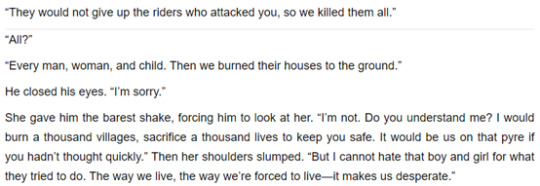
His awareness of having crossed the line is obvious by the fact that he did not want a grave. He knew it’d be desecrated. Even though he was not sorry for trying, he knew that without having achieved his end nothing could begin to excuse what he’d done. He knew how hated he was.

There would be nothing left of him; no physical remnants, no legacy, and only one person to mourn the person he could have been. He leaves the world with this knowledge.
His true name is erased.

Being in his head, we see that, upon his return he is thinking of himself as Aleksander while using a different name (Yuri’s) once more. He is still hiding, and as long as he has to hide, the world is not as he wants it. As long as he’s hiding he can’t leave a legacy behind.
So based on what we know of his actions and of the way he’s loves, I think that
- the Darkling wanting to see Alina and to be understood by her, but being resistant to her morality and crossing her one more time to take his powers back,
- being accustomed to hardship and to biding his time,
-underestimating Nikolai and the triumvirate and seeing them as weak individuals instead of considering them as a strong unit,
- using Yuri’s name but still thinking of himself as Aleksander,
-taking advantage of the Starless to make his dramatic return while saving Ravka and gaining the people’s gratitude and worship,
-wanting Ravka to win and aiding Nikolai when because HE couldn’t win single-handedly and he didn’t want to lose but still thinking that, since the bells had been destroyed, HE was a batter option to lead.
are very much in character.
There are three major things about his arc that readers may consider to be out of character:
a) The Darkling helping Zoya rise as a queen/
b) Aleksander choosing to sacrifice himself to stop the blight.
c) The public revelation of his name.
So let’s examine them one by one.
__________________________________
a) Aiding the rise of the Dragon Queen.
Aleksander questions both Zoya and Nikolai. He considers them children, one two weak to embrace her powers when she could be among the strongest Grisha who have ever lived and the other too immature to use his political power for anything more than playing pirate. In fact he thinks they are ‘dangerous to him and to his country’.
During the last battle Aleksander is forced to consider things that he hadn’t before.
One is the question Alina posed to him. Is HE the only one who can save them? The other can be summed up with Mal’s joke: ‘You’re rusty old man’.
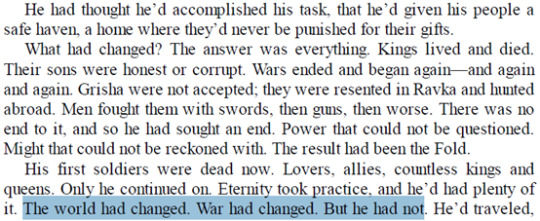
After he snapped and decided that he must rule and that he has to use the Fold, Aleksander pursued his goal single-mindedly. But war changed around him. People moved from swords, to guns, to bombs, but Aleksander’s power was constant, reliable. And then THIS was and Rasmus’ Hajefetla came. The Darkling thought he could give them victory but he HAD his power and couldn’t use it.
But even when everything seems lost, Nikolai fights and is ready to sacrifice everything. Slowly, the Darkling’s view of Nikolai shifts throughout the book.

He sees how Nikolai cares for all his people. How he was strong enough to embrace the monster and to make sacrifices and he helps him. But even then, after the bells are destroyed, he still thinks that he is the best chance his country has and steps back.
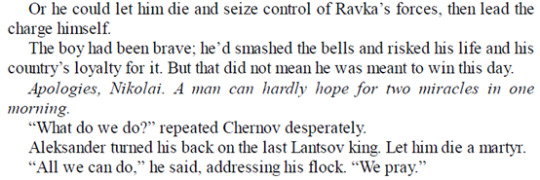
But the second miracle does happen. The Darkling had dismissed Zoya as a girl who couldn’t open her heard and embrace her power, but she opens the door. She saves the day both with her strength and with her mercy. She makes the show of power that The Darkling himself made to do and she exceeds his expectations.
And at that moment, Zoya could have been seen as a monster, a witch, all the things that Grisha had been hated for. So The Darkling chooses to give the push the people need; to be the one to break them out of their shock and push them to the direction that suits Ravka before anyone else does: ‘Sankta Zoya’.

And when he makes a stand in her favor when she gets accepted as a queen:
1) Even though I don’t believe he still thought of Zoya as a pawn at this point, I DO believe that he had realized how showing his allegiance might give him a potential opening to call in a favor if he ever needed it.
2) Helping her makes sense because even he would be able to see that a Grisha who has military, political and religious power and who has immeasurable power that could only grow gives Ravka its best chance.
3) He has the opportunity to further Ravka’s political stability while getting rid of the Apparat, whom he despises both because he betrayed him personally and because he is a rat who keeps endangering the Grisha and even Ravka as a whole.
He used all the influence he had left.
b) EXISTENTIAL CRISIS AND SELF-SACRIFICE
Throughout Rule of Wolves, The Darkling goes through an existential crisis. He is trying to remain the same, to keep to his old practices, but by the end of the book he understands that the world has changed and he has to change in some way too. He does not have a complete change of heart. People are mostly set in their personality by their adulthood and a tiger easily changing its striped after centuries would be completely unrealistic. Neither are his crimes glossed over. But the reasons he sacrifices himself are woven throughout the story.
-A theme throughout the story is that we started in Shadow And Bone from ‘the age of Grisha power is coming to an end’ and went to ‘the age of Saints is upon us’. What is the main difference between Grisha and Saints? It’s faith. It’s the way the ‘saints’ are accepted and worshipped for their power and sacrifice. The Darkling wants to be loved. He wants for his sacrifices to be recognized.


In a single scene we see both his inability to adjust to the world he finds himself in and his need for his efforts to be recognized. Because he DID give his life for Ravka. He did so, from his perspective, when he was killed during the Civil War, but he also did by not having really had peace or REALLY lived his life since he was a child.
In the main trilogy he was bitter about the Otkazats’ya easily turning on Grisha. He was bitter about how Grisha were treated by the rulers of Ravka. The Grisha had to bow but the Saints are the ones that people bowed to. Faith is the only thing that may allow them to stop hiding. So he wants to be a Saint. He didn’t manage to earn it in battle, so he must find another way.
The Darkling approaches The Starless, but even as he tries to have more rally behind him he is disappointed in his new following. During his first POV chapter he says that he will “teach the world awe”. But it’s made clear that his is not enough for him. His followers BELIEVE but their belief is hollow. They are afraid of who he truly is, they barely believe in everything he stood for. They are awed, easily manageable, but they do not care about the Grisha. They do not care about Ravka the way he does. They do not see him when he’s right in front of them, making him want to scream that he is there, that he exists, and when one glimpses behind Yuri’s mask he sees ‘evil’.

What he wants is devotion because of what he’s tried to do, not blind faith. He feels unseen; faded. Moreover, he still hides while he thought he didn’t have to. Initially he thinks that he can finally choose to be himself and to reclaim his true name: ‘The oldest of them: Aleksander. He had no reason to hide his strangeness anymore. Saints were meant to live forever.’ But he falls into old patterns. He is ‘Yuri’; he is in hiding once more.
-The Darkling DOES NOT LOVE HIS POWER in itself. He loves the strength it gives him, the feeling of being special, but he does not enjoy the darkness, despite embracing the color black or having previously chosen dark rooms for himself.
“He wanted to be out of the darkness, back beneath the watery winter sun.”
“He only wished that it wasn’t winter. He wanted to turn his face
to the sun and feel it warm him. The cold frightened him now. It felt like
death, like the long silence of not being, without sense of time or place, only
the understanding that he must hold on, that someday, there would be an end
to the terrible stillness. He’d been a long time in the dark.”
Even in his previous life, he was mesmerized by the beauty of the world.

And now he has to face THE BLIGHT: A consequence to him coming back, which, based on the fact that it expanded THE MOMENT he used his power to kill one of his followers, is connected to him growing stronger and using his power. This power, which is similar to the Fold, is independent of him and untamed in the world and creates wastelands, ruining the country that he tried to save. In fact, it is compared to a vampire; to a creature that needs blood to be sustained. It destroys all the things that Aleksander dehumanized himself to fight for and all the things he found beautiful in the world.
Even when it doesn’t touch HIM, he doesn’t know why; if it’s because this plague recognizes something in him, or if he’s so ruined that it doesn’t have a taste for him. And both scenarios show an alienation from his power. His feelings of being whole because of his power have being tainted by something he had never experienced before.
And how could he, who represents the lack of stars, the darkness, be valued and not just feared?

For the Starless Saint to become the people’s salvation the darkness that spreads across the land must be defeated by his own power of darkness,
In the original trilogy the theme of the Darkling falling into servitude of his own power was touched upon.

In RoW it was furthered. And Aleksander has made his decision:

Never again a servant; not even to his own power.
WITH THE DARKLING’S SACRIFICE:
1) He saves Ravka and allows back into the world and into the fold all the colors and the light that he used to love about it. But more importantly, At some point he mentions that “human life is worth preserving. But human lives? They come and go like so much chaff, never tipping the scales.” By holding back the Blight he ensures that human life is preserved.
2) His arc of existential crisis is resolved because he finds purpose, which he lacked after seeing that he was not enough to win the war and to create by himself the world he had craved) and saves his country in a way that only HE could, even if that wasn’t ruling. The vision Aleksander, the forgotten boy, had is aided in a way that serves the vanity of The Darkling, the eternal being he became.
3) Leigh brings full circle the theme of balance. “You were meant to be my balance”, he had told Alina. But THAT assumption was SO wrong and presumptuous. It was entitled. But finally he makes a sacrifice to be his own balance and to control what he unleashed. He caused pain and he endures pain. He was responsible for the Fold and for the Blight and he counterbalances the distraction they brought to the land and stops them from threatening Ravka.
_________
c) ‘MY NAME IS ALEKSANDER MOROZOVA’.
Some say that The Darkling publically revealing his name was out of character; probably because the only revealed it to Alina and did not want others to know it.
So let’s have a throwback to what we know.
As ‘The Starless’, the Darkling is the only unnamed saint other than the Saint of the Book, who has no memory. The theme of a name being essential to memory is constant throughout Aleksander’s arc
‘A boy’s name given up; almost forgotten.’
“It’s my own name I’m afraid of forgetting.”
In Ruin and Rising, The Darkling dying nameless serves a purpose. Alina gives him the kindness for not giving people a name to extol. He entrusted it to her and she does not betray that trust.
What I find interesting is that, in The Demon in the Wood, Baghra tells him:

He had given his name to Alina who, in a twisted way, was the closest person to his heart at that point, because he considered it his equal and in his twisted way.
To become a saint, to be worshipped, to save Ravka, to not be forgotten he has to share this piece of his heart; of himself. He has to let people read it. He considered Zoya weak because she was afraid of her heard but she was strong enough to ‘open the door’.
After living the way he did and making the choices he made, his heart can never open the same way as hers did, but this is as close as his character could come to it without Leigh glossing over all he’s done.
#the darkling#aleksander morozova#rule of wolves#row spoilers#shadow and bone#I know that no one will read this#but I just love this book so much#long post for ts#the darkling meta#aleksander morozova meta#row meta#rule of wolves meta
88 notes
·
View notes